新目标英语八年级goforit下册单元(units课文翻译)
人教版新目标go for it 八年级下册Unit1 单词拼写,课文填空和知识点梳理
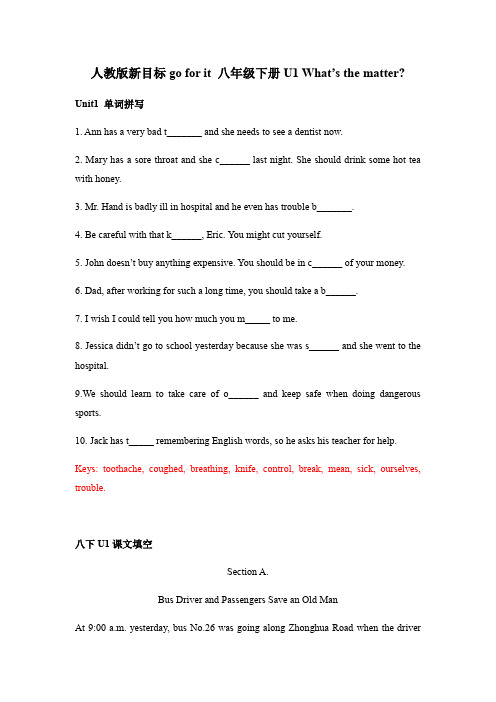
人教版新目标go for it 八年级下册U1 What’s the matter? Unit1 单词拼写1. Ann has a very bad t_______ and she needs to see a dentist now.2. Mary has a sore throat and she c______ last night. She should drink some hot tea with honey.3. Mr. Hand is badly ill in hospital and he even has trouble b_______.4. Be careful with that k______, Eric. You might cut yourself.5. John doesn’t buy anything expensive. You should be in c______ of your money.6. Dad, after working for such a long time, you should take a b______.7. I wish I could tell you how much you m_____ to me.8. Jessica didn’t go to school yesterday because she was s______ and she went to the hospital.9.We should learn to take care of o______ and keep safe when doing dangerous sports.10. Jack has t_____ remembering English words, so he asks his teacher for help. Keys: toothache, coughed, breathing, knife, control, break, mean, sick, ourselves, trouble.八下U1课文填空Section A.Bus Driver and Passengers Save an Old ManAt 9:00 a.m. yesterday, bus No.26 was going along Zhonghua Road when the driversaw an old man______(lie) on the side of the road. A woman next to him was shouting for help.The bus driver, 24-year-old Wang Ping, stopped the bus _____(with) thinking_____(two). He _____(get) off and asked the woman what happened. She said that the man_____(have) a heart problem and should go to the hospital. Mr. Wang knew he had to act _____(quick). He _____(tell) the passengers that he must take the man to the hospital. He expected most or all of the passengers to get off and wait for the next bus. But to _____(he) surprise, they all agreed _____(go) with him. Some passengers helped Mr. Wang to help the man onto the bus._____(thank) to Mr. Wang and the passengers, the doctors saved the man in time. “It’s said that many people ____(do) want to help others because they don’t want _____(some) trouble,” says one passenger. “But the driver didn’t think about _____(he). He only _____(think) about _____(save) a life.Keys: lying; without; twice; got; had; quickly; told; his; to go; Thanks ; don’t; any; himself; thought; savingSection B.He Lost His Arm But Is Still ClimbingAron Ralston is an American man ________ is interested in mountain ________(climb). As a mountain climber, Aron is used to ______________(冒险). This is one of the exciting things about doing dangerous sports. There were many times when Aron almost lost his life because of accidents. __________April 26, 2003, he found_______(he) in a very dangerous situation when climbing in Utah.On that day, Aron’s arm ________ (catch) under a 360-Kilo rock that fell on him when he was climbing by himself in the mountains. Because he could not f________ his arm, he stayed there _______five days and hoped that someone would find him.But when his water__________ (用完), he knew that he would have to do something to save his_______(自己的) life. He wasn’t ready to die that day. So he used his knife to ________ (砍断) half his right arm. Then, with his left arm, he bandaged himself _________(以便于) he wouldn’t lose too much blood. After that, he climbed down the mountain ________ (find) help,After ________(lose) his arm, he wrote a book ________(call )Between a Rock and Hard Place. This means _____(be) in a difficult situation that you can’t seem to _________(从……出来). In this book, Aron__________ (讲述) the__________(重要性) of making good decisions, and of _______________(掌管,管理) one’s life. His love for mountain climbing is so great that he kept on climbing mountains even after this experience.Do we have the same spirit as Aron? Let’s think about it before we find ourselves “between a rock and a hard place”, and before we have to make a decision that could_______ (意味着) life or death.Keys: who; climbing; taking risks; On; himself; was caught; free; for; ran out; own; cut off; so that; to find; losing; called; being; get out of ;tells of ; importance; being in control of; mean重要短语、句子汇总一、重点短语1. have a fever 发烧2. have a cough 咳嗽3. have a toothache 牙疼4. talk too much 说得太多5. drink enough water 喝足够的水6. have a cold 受凉;感冒7. have a stomachache 胃疼8. have a sore back 背疼9. have a sore throat 喉咙痛10. lie down and rest 躺下来休息11. so that 以便12. see a dentist 看牙医13. get an X-ray 拍X 光片14. take one’ s temperature 量体温15. give up 放弃16. keep on doing sth. 坚持做某事17. sound like 听起来像18. run out (of) 用完; 用尽19. in the same way 以同样的方式20. be used to doing sth. 习惯做某事21. go along 沿着……走22. on the side of the road 在马路边23. make a decision 做出决定24. without thinking twice 没有多想25. get off 下车26. have a heart problem 有心脏病27. to one’ s surprise 使....... 惊讶的28. thanks to 多亏了;由于29. in time 及时30. save a life 挽救生命31. get into trouble 造成麻烦32. right away 立刻;马上33. because of 由于34. get out of 离开;从……出去35. hurt oneself 受伤36. take risks 冒险37. fall down 摔倒38. feel sick 感到恶心39. have a nosebleed 流鼻血40. so. . . that 如此… …以至于…41. put her head back 把她的头向后仰42. have problems breathing 呼吸困难43. be in control of 掌管;管理44.小憩take breaks45.呼叫着求救shout for help46.同意与某人做某事agree to do sth with sb47.考虑think about48.准备做某事be ready to do49.切断cut off50.介意做某事mind doing sth二、重点句型1. What’ s the matter with you? / What’ s wrong with you? 你怎么了?2. What’s wrong with her? She hurt herself. 她怎么了?她不小心伤到自己了。
人教新目标版八年级下册英语全册课文原文+翻译
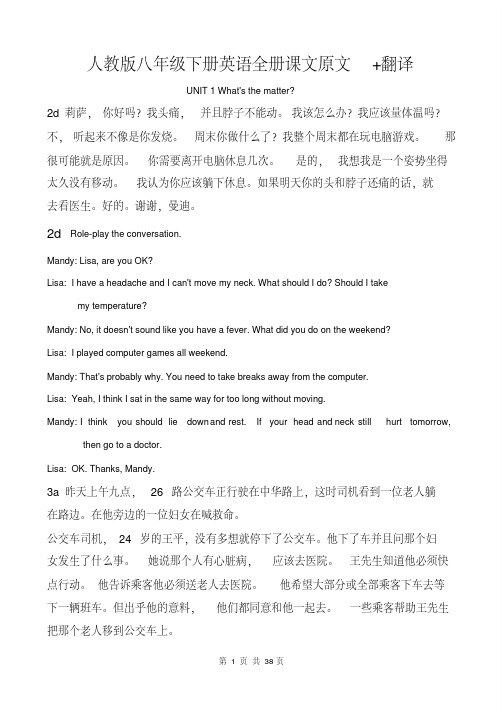
人教版八年级下册英语全册课文原文+翻译UNIT 1 What's the matter?2d 莉萨,你好吗?我头痛,并且脖子不能动。
我该怎么办?我应该量体温吗?不,听起来不像是你发烧。
周末你做什么了?我整个周末都在玩电脑游戏。
那很可能就是原因。
你需要离开电脑休息几次。
是的,我想我是一个姿势坐得太久没有移动。
我认为你应该躺下休息。
如果明天你的头和脖子还痛的话,就去看医生。
好的。
谢谢,曼迪。
2d Role-play the conversation.Mandy: Lisa, are you OK?Lisa: I have a headache and I can't move my neck. What should I do? Should I take my temperature?Mandy: No, it doesn't sound like you have a fever. What did you do on the weekend?Lisa: I played computer games all weekend.Mandy: That's probably why. You need to take breaks away from the computer.Lisa: Yeah, I think I sat in the same way for too long without moving.Mandy: I think you should lie down and rest. If your head and neck still hurt tomorrow, then go to a doctor.Lisa: OK. Thanks, Mandy.3a 昨天上午九点, 26 路公交车正行驶在中华路上,这时司机看到一位老人躺在路边。
在他旁边的一位妇女在喊救命。
人教版新目标 ( Go for it ! ) 八年级英语 (下)

人教版新目标 ( Go for it ! ) 八年级英语 (下) Unit 8 Why don’t you get her a scarf?( The first period)一、指导思想与理论依据《中小学英语课程标准》指出:英语教学中应体现交际性,要结合学生的年龄特点和生活实际,创设交际情景,通过大量的语言实践,使学生获得综合运用英语和语言技能进行交际的能力。
针对初中英语教材容量大的特点,为了使教学面向全体学生,依据Go for it!教材的课程理念,优化课堂教学,提高课堂效率,充分发挥教师的引导作用,学生的主体作用,激发学生的创造性与积极性。
二、教材分析本节课为本单元第一课时,主要是让学生理解和运用本课的重点单词和句型。
本单元的话题Gift giving 学生都很熟悉,很容易激发学生们的学习兴趣。
要求学生结合生活实际,用所学的语言项目提出给他人送礼物的建议,并能对礼物提出评论。
新教材重视以人为本,学生的发展是英语课程的出发点和归宿。
根据学生实际情况,进行“教材分析”和“教材整合”,调整教学内容以符合学生的认知水平。
三、学情分析教学的对象是初二学生,他们学习英语有较强的记忆力和模仿能力,有较强的求知欲和表现欲,但部分学生存在不自信,羞于表现等思想顾虑,但又希望能得到他人的肯定。
因此在教学活动中尽量让这部分学生参与到活动中来,有更多的机会来说英语,减少他们的恐惧感;有一些学困生由于基础薄弱,缺少丰富的语言基础,对某些任务的完成有一定的难度,教师可采取小组奖励的办法,通过学生间的合作学习,促进小组成员之间的互帮互学,鼓励小组中的优秀成员主动帮助学困生,培养学生的团队意识。
提高他们综合运用语言的能力,让他们都能体验到成功的喜悦,使各层次的学生都有所收获。
四、教学目标(1)语言知识目标:引导学生掌握本单元相关的词汇和句型。
(2)语言技能目标:能用所学的语言项目给对方提出建议和意见。
(3)情感态度目标:了解送礼的礼仪,培养学生的爱心和感恩之心。
八年级英语下册(人教新目标GoForIt!)Unit3第5课时(SectionB2a2e)说课稿

3.情感态度与价值观目标:激发学生对旅行的兴趣,了解不同国家的文化,培养学生尊重、包容多元文化的态度。
(三)教学重难点
根据对学生的了解和教学内容的分析,本节课的教学重点和难点如下:
1.教Байду номын сангаас重点:重点是使学生掌握旅行相关的词汇和现在完成时的用法,能够运用所学知识进行交流和表达。
2.生生互动:组织小组讨论、角色扮演和小组竞赛等活动,让学生在合作中交流思想,共同完成任务。这些互动方式能够促进学生之间的沟通与合作,提高他们的团队协作能力。
四、教学过程设计
(一)导入新课
为了快速吸引学生的注意力和兴趣,我将采用以下方式导入新课:
1.利用旅行主题的短视频或图片,展示世界各地风景名胜,让学生在视觉享受中产生对旅行的向往。
2.通过提问:“Have you ever been to a safari?” “Can you share your most exciting travel experience?”引发学生对旅行经历的回忆和讨论,自然过渡到本节课的主题。
(二)新知讲授
在新知讲授阶段,我将逐步呈现知识点,引导学生深入理解:
在SectionB2a2e中,主要知识点包括:1.旅行相关的词汇,如safari, adventure, exciting等;2.现在完成时的用法,特别是在描述旅行经历时的应用;3.了解和描述不同国家的文化及景点。
(二)教学目标
1.知识与技能目标:学生能够掌握本节课的生词和短语,并能运用现在完成时描述自己的旅行经历;能够理解并运用目标句型进行交流。
八年级英语下册(人教新目标GoForIt!)Unit3第5课时(SectionB2a2e)说课稿
go for it 人教版(新目标)英语 八年级 下册 单词 词汇表 带英标
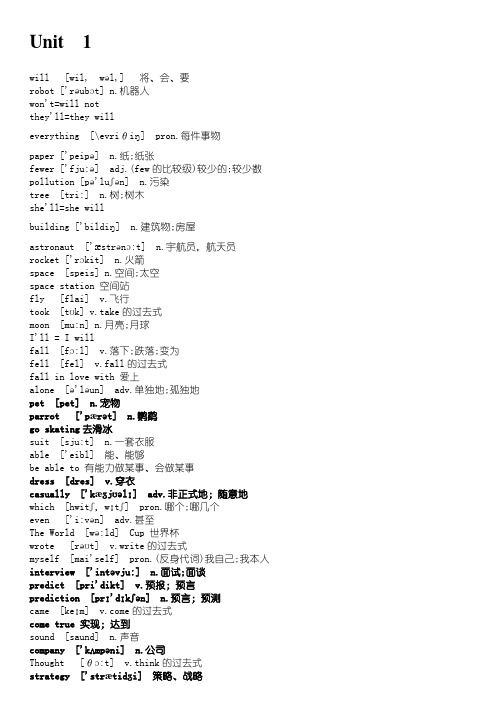
Unit 1will [wil, wəl,] 将、会、要robot ['rəubɔt] n.机器人won't=will notthey'll=they willeverything [\evriθiŋ] pron.每件事物paper ['peipə] n.纸;纸张fewer ['fju:ə] adj.(few的比较级)较少的;较少数pollution [pə'luʃən] n.污染tree [tri:] n.树;树木she'll=she willbuilding ['bildiŋ] n.建筑物;房屋astronaut ['æstrənɔ:t] n.宇航员,航天员rocket ['rɔkit] n.火箭space [speis] n.空间;太空space station 空间站fly [flai] v.飞行took [tʊk] v.take的过去式moon [mu:n] n.月亮;月球I'll = I willfall [fɔ:l] v.落下;跌落;变为fell [fel] v.fall的过去式fall in love with 爱上alone [ə'ləun] adv.单独地;孤独地pet [pet] n.宠物parrot ['pærət] n.鹦鹉go skating去滑冰suit [sju:t] n.一套衣服able ['eibl] 能、能够be able to 有能力做某事、会做某事dress [dres] v.穿衣casually ['kæʒjʊəlɪ] adv.非正式地;随意地which [hwitʃ,wɪtʃ] pron.哪个;哪几个even ['i:vən] adv.甚至The World [wə:ld] Cup 世界杯wrote [rəʊt] v.write的过去式myself [mai'self] pron.(反身代词)我自己;我本人interview ['intəvju:] n.面试;面谈predict [pri'dikt] v.预报;预言prediction [prɪ'dɪkʃən] n.预言;预测came [keɪm] e的过去式come true 实现;达到sound [saund] n.声音company ['kʌmpəni] n.公司Thought [θɔ:t] v.think的过去式strategy ['strætidʒi] 策略、战略fiction ['fikʃən] n.小说unpleasant [ʌn'plezənt] adj.使人不愉快的scientist ['saiəntist] n.科学家in the future ['fju:tʃə] 未来、将来hundred ['hʌndrəd] n.一百hundreds of 大量、许多have得(病)、患(病)already [ɔ:l'redi] adv.早已;先前made v.make的过去式factory ['fæktəri,fæktri] n.工厂simple ['simpl] adj.简单的;简易的such [sʌtʃ] adj.这样的;这种bored [bɔ:d] adj.厌烦的;厌倦的everywhere ['evrihwɛə] adv.各地;到处human ['hju:mən] n.人;人类huge [hju:dʒ] n.巨大的;极大的shape [ʃeip] n.外形;形状earthquake ['ə:θkweik] n.地震snake [sneik] n.蛇possible ['pɔsəbl] adj.可能的electric [I'lektrik] adj.电的;导电的toothbrush ['tu:θ'brʌʃ] n.牙刷seem v.像是;似乎impossible [im'pɔsəbl] adj.不可能的;不会发生的housework ['hauswə:k] n.家务;家务事rating ['reitiŋ] n.级别;等级UNIT2keep out 不让……进入play v.播放argue ['ɑ:ɡju:] v.争论;争吵wrong [rɔŋ] adj.错误的;有毛病的;不合适的What's wrong?怎么了?style [stail] n.风格、款式、式样out of style 不时髦的,过时的could [kud, kəd] modal v. can的过去式What’s the matter ['mætə] 怎么了call sb. up 打电话给ticket ['tikit] n.票;入场券surprise [sə'praiz] v.使惊奇;使意外on the phone 用电话交谈;在通话pay for 付……款、付买……的钱part-time job 兼职工作okay ['əu'kei] adj.好的either ['aiðə] adj.任一的;(两方中的)每一方的bake [beik] v.烤;烘Teen Talk [ti:n] 青少年论坛(节目名称)tutor ['tju:tə] n.家庭教师original [ə'ridʒinəl] adj.新颖的the same as 与……同样的in style [stail] 时髦的;流行的haircut ['heə'kʌt] n.理发;发型except [ik'sept] prep.除;把--除外upset [ʌp'set] adj.心烦的,沮丧的fail [feil] v.失败get on 相处;进展didn't = did notcouldn't = could notreturn [ri'tə:n] v.归还;送回football ['futbɔ:l] n.足球until [ən'til,ʌn'til] 到--为止fit …into…找到时间(做某事)as……as possible ['pɔsəbl] 尽可能……pressure ['preʃə] n.压力complain [kəm'plein] v.抱怨;埋怨、发牢骚include [in'klu:d] v.包括;包含pushy ['puʃi] adj.固执己见的;一意孤行的push [puʃ] v.推;推动;督促sent [sent] v.派遣、打发、安排去all kinds of 各种各样的compare [kəm'pɛə] v.比较crazy ['kreizi] adj.疯狂的;狂热的themselves [ðəm'selvz] (反身代词)他(她,它)们自己adult ['ædʌlt] n.成年人on the one hand (在)一方面organized ['ɔ:ɡənaizd] adj.有组织的on the other hand (在)另一方面freedom ['fri:dəm] n.自由UNIT 3UFO ['ju:ef'əʊ] 不行飞行物;飞碟barber ['bɑ:bə] (为男子服务的)理发师barber shop 理发店bathroom ['bɑ:θrum] 浴室bedroom ['bed'ru:m] 卧室;寝室kitchen ['kitʃin] 厨房get out 出去;离开alien ['eiljən] 从另一个世界来的生物;外星人bought [bɔ:t] buy的过去式land [lænd] 着陆got [gɔt] get的过去式take off 起飞while [hwail] 当……的时候experience [iks'piəriəns] 经历;体验imagine [I'mædʒin] 想象;设想strange [streindʒ] 奇怪的;陌生的follow ['fɔləu] 跟随;追随amazing [ə'meɪzɪŋ] 令人惊奇的kid [kid] 开玩笑;戏弄;欺骗scared [skeəd] 恐惧的climb [klaim] 攀登;爬jump [dʒʌmp] 跳跃shout [ʃaut] 呼喊;呼叫rode [rəʊd] ride的过去式train station ['steiʃən] 火车站ran [ræn] run的过去式run away 逃跑;跑掉anywhere [enihwɛə] 任何地方met [met] meet的过去式come in 进来happen ['hæpən] 发生accident ['æksidənt] 事故Beijing Internation Airport ['ɛəpɔ:t] 北京国际机场plane [plein] 飞机heard [həːd] hear的过去式modern ['mɔdən] 现代的;现代化的kill [kil] 杀死;致死Memphis [memfis] 孟菲斯(美国田纳西州西南部一城市)murder ['mə:də] v.and n.谋杀;凶杀hear about 听说bright [brait] adj.明亮的;发亮的playground ['pleiɡraund] n.运动场;操场bell [bel] n.钟;铃;门铃rang [ræŋ] v.ring的过去式told [təʊld] v.tell的过去式close [kləuz] v.关闭silence ['sailəns] n.寂静;沉静take place [pleis] 发生recent ['ri:snt] adj.最近的;近来的World Trade Center [wə:ld,treid, 'sentə] 世界贸易中心destroy [dis'trɔi] v.破坏;毁坏terrorist ['terərɪst] n.恐怖分子meaning ['mi:niŋ] n.意思;含义as……as 像……(一样)became [bɪ'keɪm] v.become的过去式flight [flait] n.航班,班机earth [ə:θ] n.地球hero ['hiərəu] n.英雄flew [flu:] v.fly的过去式UNIT 4mad [mæd] adj.很生气的;气愤的anymore ['enimɔː] adv.再也(不),(不)再direct speech [di'rekt,spi:tʃ] 直接引语reported speech [ri'pɔ:tid] 间接引语first of all 首先message ['mesidʒ] n.消息;信息pass on 传递supposed [sə'pəʊzd] v.假定;认为;期望be supposed to 被期望或被要求……hard-working adj.勤勉的,努力工作的do well in 在……方面做得好in good health 身体健康report card [riˈpɔ:t] 成绩单nervous ['nə:vəs] adj.神经紧张的;不安的envelope ['envələup] n.信封semester [si'mestə] n.学期true [tru:] adj.真实的disappointing ['dɪsə'pɔɪntɪŋ] 使人失望的;令人扫兴的lucky ['lʌki] adj.幸运的copy [kəup] v.复制;抄袭own [əun] adj.自己的get over 克服;恢复;原谅poor [puə] 贫穷的、贫困的American [ə'merɪkən] 美国的、美洲的village ['vilidʒ] n.乡村Peking University [pi:'kiŋ,'ju:ni'və:siti]北京大学graduate ['ɡrædjuit] n.大学毕业生volunteer ['vɔlən'tiə] n.志愿者The Ministry of Education 教育部Chinese Young Pioneer ['paiəˈniə] 中国少年先锋队rural ['ruərəl] adj.乡下的,乡村的area ['ɛəriə] n.地区;地域meter ['mi:tə] n.米;公尺sea level ['levl] 海平面thin adj.稀薄的ate v.eat的过去式fortunately ['fɔ:tʃənətli] adv.幸运地decision [di'siʒən] n.决定;决心husband ['hʌzbənd] n.丈夫dormitory ['dɔ:mitri] n.宿舍senior high school ['si:njə] 高中Open up 打开star n.开始;开端influence ['influəns] n.影响return [ri'tə:n] v.回来;返回hometown ['həʊm'taʊn] n.家乡;故乡Greenpeace ['ɡri:npi:s] “绿色和平”组织care for 照料;照顾UNICEF(United Nations International Children’s Emergency Fund) [I'mə:dʒənsi] 联合国儿童基金会WWF(World Wildlife Fund) ['waɪld'laɪf] 世界野生动物基金会danger ['deindʒə] n.危险UNIT 5have a great time 玩的愉快organize ['ɔ:ɡənaiz] v.组织take away 拿走clean-up 清除;打扫flower ['flauə] n.花agent ['eidʒənt] n.代理人;代理商around the world 在世界各地make a living 谋生against [ə'ɡenst, ə'ɡeinst] prep.反对、对…不利charity ['tʃæriti] n.慈善团体;慈善事业chance [tʃɑ:ns] n.机会;机遇all the time 一直injured [ɪndʒə] adj.受伤的;受损害的sincerely [sɪn'sɪəlɪ] adv.真诚地lawyer ['lɔ:jə] n.律师tonight [tə'nait] n.今晚;今夜mobile phone ['məubail] 移动电话REVIEW OF UNITS 1-5What’s the problem? ['prɔbləm] 怎么了?fat adj.胖的;肥的window ['windəu] n.窗户play football 踢足球consequence ['kɔnsikwəns] n.结果explain [iks'plein] v.解释;说明following ['fɔləuiŋ] adj.下列的;下述的UNIT 6collect [kə'lekt] v.收集;搜集shell [ʃel] n.贝壳;壳marathon ['mærə'θɔn] 体育比赛中)马拉松赛跑pair n.一对;一双skate [skeit] n.溜冰鞋since [sins] 自从;从……以来Hilltop School ['hɪl'tɔp] 一学校名称、可译为山顶学校raise [reiz] v.筹集several ['sevrəl] 几个的;数个的skater ['skeɪtə] n.溜冰者stamp [stæmp] n.邮票kite n.风筝monster ['mɔnstə] n.怪物,妖怪globe [ɡləub] n.球状体;球体anyone 任何人run out of 用完;用尽store [stɔ:] v.储存cake n.蛋糕;糕、饼类食品particularly [pə'tikjuləli] 特别;尤其;异乎寻常的collector [kə'lektə] n.收藏家by the way 顺便;附带说说common [ˈkɔmən] adj.共同的;公共的extra ['ekstrə] adj.额外的coin [kɔin] n.钱币;硬币topic ['tɔpik] n.话题;主题been v.be的过去分词be interested in 对……感兴趣writer ['raitə] n.作家,作者dynasty ['dainəsti] n.朝代;王朝character ['kæriktə] n.(著名的)人物;名人capital ['kæpitl] n.省会,首都European ['jʊərə'pi:ən] 欧洲的;欧洲人(的)Russian ['rʌʃən] adj.俄罗斯的;俄罗斯人(的)Australian [ɔ:'streɪljən] adj.澳大利亚的;澳大利亚人的 n.澳大利亚人Jewish ['dʒu:ɪʃ] adj.犹太人的;犹太族的Jew [dʒu:] n.犹太人thousand ['θaʊzənd] n.一千emperor ['empərə] n.皇帝foreigner ['fɔrinə] n.外国人quite [kwait] adv.相当;十分certain ['sə:tn] adj.确实的;无疑的the Olympic Games [əʊ'lɪmpɪk] 奥林匹克运动会far away 在远处miss v.思念;想念UNIT7not at all 一点也不turn down 把……调低;关小yard [jɑ:d] n.院子right away 立刻;马上task [tɑ:sk] n.任务;工作;作业poster ['pəustə] n.海报waitress ['weɪtrɪs] n.女服务生brought [brɔ:t] v.bring的过去式solution [sə'lu:ʃən] n.解答、解决办法line n.排;队;列wait in line 排队等候annoy [ə'nɔi] v.使恼怒,使生气annoyed [ə'nɔɪd] adj.恼怒的,生气的polite [pə'lait] adj.有礼貌的;客气的perhaps [pə'hæps] adv.或许;大概door n.门cut in line 插队hasn't = has notterm [tə:m] n.术语etiquette ['etɪ'ket] n.礼节normal ['nɔ:məl] adj.正常的;正规的behavior [bɪ'heɪvjə] n.行为;举止;表现at first 首先Asian ['eɪʒən, 'eɪʃən] adj.亚洲的;亚洲人的uncomfortable [ʌn'kʌmfətəbəl] adj.不舒服的impolite ['ɪmpə'laɪt] adj.无理的;粗鲁的allow [ə'lau] v.允许;准许keep …down 控制;抑制voice [vɔis] n.声音public ['pʌblik] n.公众take care 当心;小心cough [kɔf] v.咳嗽sneeze [sni:z] 打喷嚏break [breik] v.打破,违背break the rule 违反规则politely [pə'laɪtlɪ] adv.客气地;斯文地smoke [sməuk] v.抽烟;吸烟put out 扑灭、熄灭(火)、关灯cigarette ['siɡə'ret] n.香烟criticize ['kritisaiz] v.批判careful ['kɛəful] adj.当心;小心drop [drɔp] v.落下;掉下litter ['litə] n.垃圾pick [pik] v.采;摘;挑选pick …up 捡起behave [bi'heiv] v.举止;表现UNIT8comment ['kɔment] n.评论;意见album ['ælbəm] n.集子;唱片集;相片簿personal ['pə:sənəl] adj.私人的;个人的special ['speʃəl] adj.特别的;特殊的;专门的receive [ri'si:v] v.收到;接受gave [ɡeiv] v.give的过去式guy [ɡai] n.家伙;人spider ['spaidə] n.蜘蛛mouse [maus] n.(pl.mice)老鼠hamster ['hæmstə] n.仓鼠snake [sneik] n.蛇turtle ['tə:tl] n.海龟child [tʃaild] n.孩子;儿女pot-bellied [pɔt],'belid] 大腹便便的;大肚子的pig n.猪advantage [əd'vɑ:ntidʒ] n.有利条件;优点disadvantage ['disəd'vɑ:ntidʒ] n.不利条件;缺点popular ['pɔpjulə] adj.流行的perfect ['pə:fikt] adj.完美的,理想的rabbit ['ræbit] n.兔;野兔clean [kli:n] adj.清洁的;干净的company ['kʌmpəni] n.伙伴cost [kɔst] v.价值(若干);花(多少钱)asleep [ə'sli:p] adj.睡着的fall asleep 入睡choose [tʃu:z] v.选择present ['prezənt] n.礼物open v.打开gave [ɡeiv] v.give的过去式give away 赠送;分发bench [bentʃ] n.长凳;长椅rather than ['rɑ:ðə] 而不是Sweden ['swi:dn] 瑞典instead [in'sted] adv.代替;而不是the Olympics [əʊ'lɪmpɪks] 奥林匹克运动会enter ['entə,'entə(r)] v.参加;进入nearly ['niəli] adv.几乎sang [sæŋ] v.sing的过去式clearly ['klɪəlɪ] adv.清楚地;明显地stage [steidʒ] n.舞台native ['neitiv] adj.本地的;本国的native speaker 以某种语言为母语的人;说本族语的人winner ['wɪnə] n.胜利者modest ['mɔdist] adj.谦虚的,谦让的interested ['ɪntrɪstɪd] adj.感兴趣的encourage [in'kʌridʒ] v.鼓励spokesperson ['spəukspə:sn] n.发言人;代言人progress ['prəuɡres] n.进步;前进take an interested in 对……感兴趣hear of 听说make progress ['prəuɡres] 取得进步;取得进展besides 而且;除……之外make friends with 与……交友statement ['steitmənt] n.声明;陈述mention ['menʃən] v.提及;说起drive [draiv] v.开车;驾驶UNIT 9amusement ['ə'mju:zmənt] n.娱乐;消遣neither ['ni:ðə] pron.(二者)都不玩的愉快disneyland ['dɪznɪlænd] 迪斯尼乐园Mickey Mouse ['miki] 米老鼠Donald Duck ['dɔnəld] 唐老鸭character ['kæriktə] n.人物;角色seen v.see的过去分词theme [θi:m] n.主题attraction [ə'trækʃən] n.有吸引力的事物(人)roller coaster [ˈrəulə,'kəʊstə] 过山车cruise [kru:z] n.巡游;巡航board [bɔ:d] n.甲板on board 在船上route [ru:t] n.路线end up 结束island ['ailənd] n.岛;岛屿especially [is'peʃəli] adv.特别;尤其exchange student [iks'tʃeindʒ] n.交换生attendant [ə'tendənt] n.服务员flight attendant (飞机上的)空中服务员discover [dis'kʌvə] v.发现requirement [ri'kwaiəmənt] n.要求,必要条件guide [ɡaid] n.导游tour guide [tuə] 导游three quarters [ˈkwɔ:təs] n.四分之三foreign ['fɔrin] adj.外国的;外来的film n.电影southeast ['sauθ'i:st] n.东南 adj.东南的wonderful ['wʌndəful,'wʌndərfl] adj.极好的holiday ['hɔlədi] n.假日;假期节日quarter ['kwɔ:tə] n.四分之一;一刻钟population ['pɔpju'leiʃən] n.人口fear [fiə] v.害怕;担心brave [breiv] adj.勇敢的;无畏的excellent ['eksələnt] adj.卓越的;极好的Indian ['ɪndjən] adj.印度的;印度人的Night Safari [sə'fɑ:ri:] 夜间野生动物园dark [dɑ:k] n.黄昏;黑暗fox [fɔks] n.狐狸wake [weik] v.醒来;唤醒wake up 睡醒;醒来daytime ['deɪ'taɪm] n.白天;日间natural ['nætʃərəl,'nætʃrəl] 自然的;自然界的environment [in'vaiərənmənt] n.环境temperature ['tempəritʃə] n.温度all year round 一年到头,终年equator [I'kweitə] n.赤道whenever [hwen'evə] conj.无论如何spring [spriŋ] n.春天autumn ['ɔ:təm] n.秋天season ['si:zən,'siːzn] n.季节type ] [taip] n.类型awake [ə'ˈweik] adj.醒着的UNIT 10Franklin ['fræŋklin] 富兰克林湖noon n.中午sandy ['sændi:, 'sændi] adj.含沙的goodbye ['ɡʊd'baɪ] int.再见look through 浏览bookstore ['bʊk'stɔ:] n.书店cross [krɔs] v.穿过;横过;越过elevator ['eliveitə] n.电梯low [ləu] adj.低的slow [sləu] adj.慢的;缓慢的fan [fæn] n.迷;狂热迷note [nəut] n.短信;笔记come along [ə'lɔŋ] 出现;发生get along 相处baby n.婴儿;小孩at least [li:st] 至少traffic ['træfik] n.交通least [li:st] adj.little的最高级REVIEW OF UNITS 6-10review [ri'vju:] n.复习;回顾erhu 二胡(乐器名)Subtitle ['sʌb'taɪtl] n.(电影或电视上的)字幕web page 网页。
go for it八年级英语下册课文单元作文范文
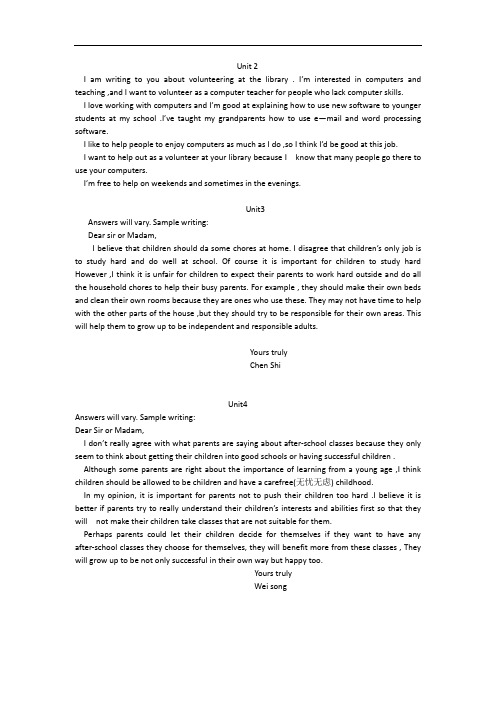
Unit 2I am writing to you about volunteering at the library . I’m interested in computers and teaching ,and I want to volunteer as a computer teacher for people who lack computer skills.I love working with computers and I’m good at explaining how to use new software to younger students at my school .I’ve taught my grandparents how to use e—mail and word processing software.I like to help people to enjoy computers as much as I do ,so I think I’d be good at this job.I want to help out as a volunteer at your library because I know that many people go there to use your computers.I’m free to help on weekends and sometimes in the evenings.Unit3Answers will vary. Sample writing:Dear sir or Madam,I believe that children should da some chores at home. I disagree that children’s only job is to study hard and do well at school. Of course it is important for children to study hard However ,I think it is unfair for children to expect their parents to work hard outside and do all the household chores to help their busy parents. For example , they should make their own beds and clean their own rooms because they are ones who use these. They may not have time to help with the other parts of the house ,but they should try to be responsible for their own areas. This will help them to grow up to be independent and responsible adults.Yours trulyChen ShiUnit4Answers will vary. Sample writing:Dear Sir or Madam,I don’t really agree with what parents are saying about after-school classes because they only seem to think about getting their children into good schools or having successful children . Although some parents are right about the importance of learning from a young age ,I think children should be allowed to be children and have a carefree(无忧无虑) childhood.In my opinion, it is important for parents not to push their children too hard .I believe it is better if parents try to really understand their children’s interests and abilities first so that they will not make their children take classes that are not suitable for them.Perhaps parents could let their children decide for themselves if they want to have any after-school classes they choose for themselves, they will benefit more from these classes , They will grow up to be not only successful in their own way but happy too.Yours trulyWei songUnit5An important event that I remember well was the Indian Ocean earthquake and tsunami that happened on December 26,2004.The earthquake happened under the sea and caused a tsunami that killed many people and destroyed many places in different countries.when I heard the news of the earthquake and tsunami,I was hanging out at my classmate’s house with my friends.My friends were eating snacks and playing computer games.I remember this event well bacause my mother was in phuket(普吉岛),Thailand at the time for her job,and phuket was one of the places affected by the tsunami. I was so worried and afraid for my mother that I cried.I went home immediately and waited for hours with family before we received the news that my mother was alive and safe.Unit6Answers will vary. Sample writing:Whales are huge animals. They live in the sea and eat small fish and other sea life. One interesting fact is whales can jump high out of the water. Some kind of whales are in danger because humans catch them for meat ,fat ,and oil, and use whale part to make candles and shop . whales are also in danger from water protection. We should protect whales by making rules on whale protection and by not putting rubbish into the sea . I think people should learn more about whales.。
新目标英语八年级Go for it下册1-5单元 (Units 1-5课文 翻译)
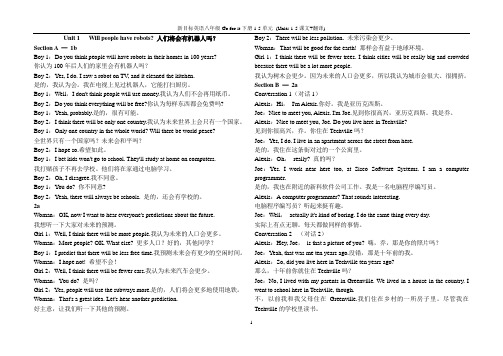
Unit 1 Will people have robots? 人们将会有机器人吗?Section A —1bBoy 1:Do you think people will have robots in their homes in 100 years?你认为100年后人们的家里会有机器人吗?Boy 2:Yes, I do. I saw a robot on TV, and it cleaned the kitchen.是的,我认为会。
我在电视上见过机器人,它能打扫厨房。
Boy 1:Well,I don't think people will use money.我认为人们不会再用纸币。
Boy 2:Do you think everything will be free?你认为每样东西都会免费吗?Boy 1:Yeah, probably.是的,很有可能。
Boy 2:I think there will be only one country.我认为未来世界上会只有一个国家。
Boy 1:Only one country in the whole world? Will there be world peace?全世界只有一个国家吗?未来会和平吗?Boy 2:I hope so.希望如此。
Boy 1:I bet kids won't go to school. They'll study at home on computers.我打赌孩子不再去学校。
他们将在家通过电脑学习。
Boy 2:Oh, I disagree.我不同意。
Boy 1:You do? 你不同意?Boy 2:Yeah, there will always be schools. 是的,还会有学校的。
2aWoman:OK, now I want to hear everyone's predictions about the future.我想听一下大家对未来的预测。
八年级英语下册(人教新目标GoForIt!)Unit3第4课时(SectionB1a1e)说课稿

-学生对动物产生兴趣,增强关爱动物、保护自然的意识。
-学生在学习过程中,培养积极向上的学习态度,提高自信心。
(三)教学重难点
根据对学生的了解和教学内容的分析,本节课的教学重点和难点如下:
1.教学重点:
-掌握动物词汇和句型,并能运用它们进行简单对话。
-学会使用形容词比较级和最高级来描述和比较动物。
4.结合学生的生活实际,让他们用英语描述自己熟悉的动物,增加学习的实用性和趣味性。
三、教学方法与手段
(一)教学策略
在本节课中,我将采用以下主要教学方法:
1.任务型教学法:通过设计各种真实、有意义的任务,引导学生运用所学知识进行交流。这种方法的理论依据是交际语言教学法,旨在提高学生的实际语言运用能力。
-句型的灵活运用,尤其是对不同动物特点的描述和比较。
-形容词比较级和最高级的正确使用,以及在实际对话中的应用。
在教学过程中,教师需要关注学生对这些重难点的掌握情况,并通过各种教学活动帮助学生突破难点,提高英语水平。”
五、板书设计与教学反思
(一)板书设计
我的板书设计将遵循清晰、简洁、结构化的原则。板书布局分为三个部分:左边是动物词汇列表,中间是主要句型和语法点,右边是课堂活动提示和重要注意事项。主要内容将包括:
3.情感态度与价值观:
-学生对动物产生兴趣,增强关爱动物、保护自然的意识。
-学生在学习过程中,培养积极向上的学习态度,提高自信心。
(三)教学重难点
根据对学生的了解和教学内容的分析,本节课的教学重点和难点如下:
1.教学重点:
-动物词汇的掌握和运用。
-句型的理解和运用。
-形容词比较级和最高级的用法。
2.教பைடு நூலகம்难点:
人教新目标版八年级下册英语全册 课文原文+翻译
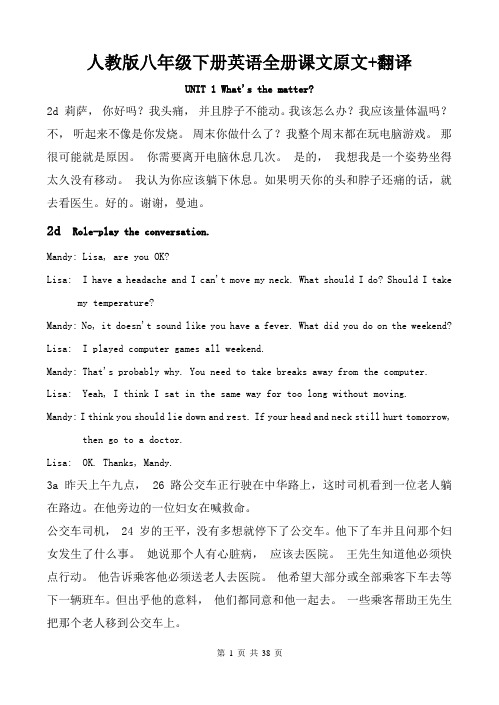
人教版八年级下册英语全册课文原文+翻译UNIT 1 What's the matter?2d 莉萨,你好吗?我头痛,并且脖子不能动。
我该怎么办?我应该量体温吗?不,听起来不像是你发烧。
周末你做什么了?我整个周末都在玩电脑游戏。
那很可能就是原因。
你需要离开电脑休息几次。
是的,我想我是一个姿势坐得太久没有移动。
我认为你应该躺下休息。
如果明天你的头和脖子还痛的话,就去看医生。
好的。
谢谢,曼迪。
2d Role-play the conversation.Mandy: Lisa, are you OK?Lisa: I have a headache and I can't move my neck. What should I do? Should I take my temperature?Mandy: No, it doesn't sound like you have a fever. What did you do on the weekend? Lisa: I played computer games all weekend.Mandy: That's probably why. You need to take breaks away from the computer. Lisa: Yeah, I think I sat in the same way for too long without moving.Mandy: I think you should lie down and rest. If your head and neck still hurt tomorrow, then go to a doctor.Lisa: OK. Thanks, Mandy.3a 昨天上午九点, 26 路公交车正行驶在中华路上,这时司机看到一位老人躺在路边。
在他旁边的一位妇女在喊救命。
go for it英语 八年级下 unit9
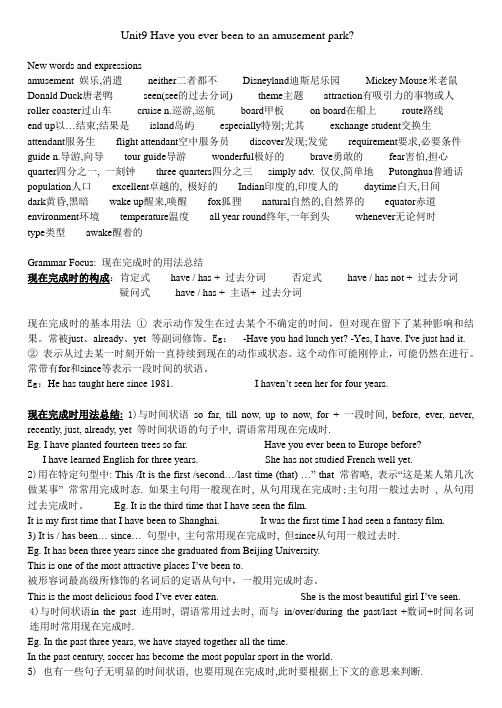
Unit9 Have you ever been to an amusement park?New words and expressionsamusement 娱乐,消遣neither二者都不Disneyland迪斯尼乐园Mickey Mouse米老鼠Donald Duck唐老鸭seen(see的过去分词) theme主题attraction有吸引力的事物或人roller coaster过山车cruise n.巡游,巡航board甲板on board在船上route路线end up以…结束;结果是island岛屿especially特别;尤其exchange student交换生attendant服务生flight attendant空中服务员discover发现;发觉requirement要求,必要条件guide n.导游,向导tour guide导游wonderful极好的brave勇敢的fear害怕,担心quarter四分之一, 一刻钟three quarters四分之三simply adv. 仅仅,简单地Putonghua普通话population人口excellent卓越的, 极好的Indian印度的,印度人的daytime白天,日间dark黄昏,黑暗wake up醒来,唤醒fox狐狸natural自然的,自然界的equator赤道environment环境temperature温度all year round终年,一年到头whenever无论何时type类型awake醒着的Grammar Focus: 现在完成时的用法总结现在完成时的构成:肯定式have / has + 过去分词否定式have / has not + 过去分词疑问式have / has + 主语+ 过去分词现在完成时的基本用法①表示动作发生在过去某个不确定的时间,但对现在留下了某种影响和结果。
常被just、already、yet 等副词修饰。
人教新目标(Go for it)版八年级下Unit 1 What's the matter_单元单词

人教版新目标八年级英语下册,第1单元单词英汉汉英专项训练(前面是题,后面紧接是答案;分为填空题和选择题两种。
)(1)press______________________(2)risk______________________(3)onto______________________(4)spirit______________________(5)have a cold______________________(6)have a stomachache______________________(7)be used to______________________(8)lie down______________________(9)death______________________(10)run out______________________(11)nosebleed______________________(12)bandage______________________(13)get out of______________________(14)herself______________________(15)take risks______________________(16)foot______________________(17)headache______________________(18)breathe______________________(19)climber______________________(20)break______________________(21)rest______________________(22)rock______________________(23)cut off______________________(24)neck______________________(25)fever______________________(26)get into______________________(27)trouble______________________(28)lie______________________(29)knee______________________(30)passenger______________________(31)sunburned______________________(32)give up______________________(33)to one's surprise______________________(34)control______________________(35)matter______________________(36)knife______________________(37)take one's temperature______________________(38)cough______________________(39)hit______________________(40)be in control of______________________(41)toothache______________________(42)right away______________________(43)sore______________________(44)off______________________(45)ourselves______________________(46)hurt______________________(47)decision______________________(48)take breaks______________________(49)importance______________________(50)What's the matter______________________(51)nurse______________________(52)kilo______________________(53)mean______________________(54)stomachache______________________(55)X-ray______________________(56)accident______________________(57)throat______________________(58)stomach______________________(59)situation______________________(60)have a fever______________________(61)blood______________________(62)get off______________________(63)sick______________________(1)n. 压,挤,按(2)n.&v.危险;风险;冒险(3)prep.向;朝(4)n.勇气;意志(5)感冒(6)胃痛(7)习惯于;适应于(8)躺下(9)n.死;死亡(10)用光;耗尽(run out of)(11)n.鼻出血(12)n.綳带v.用绷带包扎(13)离开;从...出来(14)pron.(she 的反身代词)她自己(15)冒险(take a rish)(16)n.脚;足(17)n.头痛(18)v.呼吸(19)n.登山者;攀登者(20)n.间歇;休息(21)v.&n.放松;休息(22)n.岩石(23)切除(24)n.颈;脖子(25)n.发烧(26)陷入;参与(27)n.问题;苦恼(28)v.躺;平躺(29)n.膝;膝盖(30)n.乘客;旅客(31)adj.晒伤的(32)放弃(33)使...惊讶的;出乎...意料(34)n.&v.限制;约束;管理(35)n.问题;事情(36)n.刀(37)量体温(38)n.v.咳嗽;(39)(用手或器具)击;打(40)掌管;管理(41)n..牙痛(42)立即;马上(43)adj.疼痛的;酸痛的(44)adv.prep 离开(某处);不工作;从...去掉(45)pron.我们自己(we的反身代词)(46)v.(使)疼痛;受伤(47)n.决定;抉择(48)休息(49)n.重要性;重要(50)怎么了?出什么事了?(51)n.护士(52)n.千克;公斤(53)v.意思是;打算;意欲(54)n.胃痛;腹痛(55)n.X 射线;X光(56)n.(交通)事故;意外遇险(57)n.咽喉;喉咙(58)n.胃;腹部(59)n.情况;状况(60)发烧(61)n.血(62)下车(63)adj.生病的;有病的( )1.pressA. adj.生病的;有病的B. n. 压,挤,按C. v.(使)疼痛;受伤D. pron.我们自己(we的反身代词)( )2.riskA. n.&v.危险;风险;冒险B. n.鼻出血C. n.登山者;攀登者D. n.岩石( )3.ontoA. n.v.咳嗽;B. n.问题;事情C. prep.向;朝D. n.血( )4.spiritA. n.勇气;意志B. n..牙痛C. 放弃D. n.发烧( )5.have a coldA. n.问题;事情B. n.乘客;旅客C. 感冒D. n.间歇;休息( )6.have a stomachacheA. 立即;马上B. v.呼吸D. 怎么了?出什么事了?( )7.be used toA. 习惯于;适应于B. n.颈;脖子C. n.勇气;意志D. v.意思是;打算;意欲( )8.lie downA. n.间歇;休息B. 躺下C. n.綳带v.用绷带包扎D. 掌管;管理( )9.deathA. n.岩石B. n.乘客;旅客C. n.死;死亡D. 冒险(take a rish)( )10.run outA. 胃痛B. n..牙痛C. 用光;耗尽(run out of)D. n.脚;足( )11.nosebleedA. n.死;死亡B. n.问题;苦恼C. n.咽喉;喉咙D. n.鼻出血( )12.bandageA. n.綳带v.用绷带包扎B. v.呼吸C. 切除D. 躺下( )13.get out ofA. n..牙痛B. n.头痛C. 离开;从...出来D. n.(交通)事故;意外遇险( )14.herselfA. n.登山者;攀登者B. pron.(she 的反身代词)她自己C. n.綳带v.用绷带包扎D. n.重要性;重要( )15.take risksA. 怎么了?出什么事了?B. n.刀C. 量体温D. 冒险(take a rish)( )16.footA. n.脚;足B. n. 压,挤,按C. adv.prep 离开(某处);不工作;从...去掉( )17.headacheA. n.头痛B. 感冒C. prep.向;朝D. 陷入;参与( )18.breatheA. v.呼吸B. n.胃痛;腹痛C. 掌管;管理D. 胃痛( )19.climberA. 放弃B. n.脚;足C. n..牙痛D. n.登山者;攀登者( )20.breakA. 离开;从...出来B. n.勇气;意志C. n.间歇;休息D. 习惯于;适应于( )21.restA. v.&n.放松;休息B. 立即;马上C. n.情况;状况D. adj.疼痛的;酸痛的( )22.rockA. n.岩石B. n.登山者;攀登者C. 躺下D. 切除( )23.cut offA. n..牙痛B. v.躺;平躺C. 切除D. 使...惊讶的;出乎...意料( )24.neckA. n.&v.危险;风险;冒险B. n..牙痛C. n.颈;脖子D. n.勇气;意志( )25.feverA. 切除B. n.乘客;旅客C. 感冒D. n.发烧( )26.get intoA. n.千克;公斤B. 下车C. v.&n.放松;休息D. 陷入;参与( )27.troubleA. (用手或器具)击;打B. 冒险(take a rish)C. 量体温D. n.问题;苦恼( )28.lieA. v.躺;平躺B. pron.(she 的反身代词)她自己C. n.(交通)事故;意外遇险D. n.发烧( )29.kneeA. n.膝;膝盖B. n.问题;事情C. n.岩石D. n.咽喉;喉咙( )30.passengerA. 习惯于;适应于B. n.间歇;休息C. 量体温D. n.乘客;旅客( )31.sunburnedA. n.綳带v.用绷带包扎B. adj.晒伤的C. n.发烧D. 掌管;管理( )32.give upA. n.发烧B. 放弃C. (用手或器具)击;打D. v.(使)疼痛;受伤( )33.to one's surpriseA. n.发烧B. n.鼻出血C. n.膝;膝盖D. 使...惊讶的;出乎...意料( )34.controlA. 发烧B. 怎么了?出什么事了?C. n.&v.限制;约束;管理D. n.胃;腹部( )35.matterA. n.问题;事情B. v.呼吸C. v.&n.放松;休息D. 量体温( )36.knifeA. n.刀B. n.情况;状况C. 陷入;参与D. pron.(she 的反身代词)她自己( )37.take one's temperatureA. pron.我们自己(we的反身代词)B. 量体温C. n.登山者;攀登者D. n.千克;公斤( )38.coughA. 切除B. n.v.咳嗽;C. n.颈;脖子D. v.(使)疼痛;受伤( )39.hitA. (用手或器具)击;打B. adj.疼痛的;酸痛的C. pron.(she 的反身代词)她自己D. v.呼吸( )40.be in control ofA. n.问题;事情B. n.(交通)事故;意外遇险C. 掌管;管理D. n.&v.危险;风险;冒险( )41.toothacheA. n..牙痛B. n.勇气;意志C. 放弃D. v.&n.放松;休息( )42.right awayA. n.綳带v.用绷带包扎B. n.乘客;旅客C. 立即;马上D. n.X 射线;X光( )43.soreA. v.意思是;打算;意欲B. n.膝;膝盖C. n.情况;状况D. adj.疼痛的;酸痛的( )44.offA. n.头痛B. 躺下C. n.刀D. adv.prep 离开(某处);不工作;从...去掉( )45.ourselvesA. 用光;耗尽(run out of)B. n.决定;抉择C. v.躺;平躺D. pron.我们自己(we的反身代词)( )46.hurtA. 感冒B. n. 压,挤,按C. v.(使)疼痛;受伤D. adj.疼痛的;酸痛的( )47.decisionA. n.刀B. 切除C. n.&v.危险;风险;冒险D. n.决定;抉择( )48.take breaksA. n.问题;事情B. 用光;耗尽(run out of)C. n.胃痛;腹痛D. 休息( )49.importanceA. n.重要性;重要B. v.(使)疼痛;受伤C. 离开;从...出来D. n.胃痛;腹痛( )50.What's the matterA. 立即;马上B. 怎么了?出什么事了?C. n.头痛D. 掌管;管理( )51.nurseA. n.头痛B. 感冒C. 下车D. n.护士( )52.kiloA. n.胃;腹部B. n.咽喉;喉咙C. prep.向;朝D. n.千克;公斤( )53.meanA. 切除B. v.意思是;打算;意欲C. 量体温D. n.情况;状况( )54.stomachacheA. 用光;耗尽(run out of)B. pron.我们自己(we的反身代词)C. n.乘客;旅客D. n.胃痛;腹痛( )55.X-rayA. n.决定;抉择B. n.问题;事情C. n.岩石D. n.X 射线;X光( )56.accidentA. n.登山者;攀登者B. n. 压,挤,按C. n.(交通)事故;意外遇险D. 冒险(take a rish)( )57.throatA. n.咽喉;喉咙B. n.决定;抉择C. n.胃痛;腹痛D. (用手或器具)击;打( )58.stomachA. n.膝;膝盖B. 休息C. n.鼻出血D. n.胃;腹部( )59.situationA. n.情况;状况B. 放弃C. n. 压,挤,按D. 躺下( )60.have a feverA. pron.我们自己(we的反身代词)B. n.v.咳嗽;C. 用光;耗尽(run out of)D. 发烧( )61.bloodA. n. 压,挤,按B. n.血C. n.岩石D. 下车( )62.get offA. 放弃B. n.胃;腹部C. 下车D. n. 压,挤,按( )63.sickA. 怎么了?出什么事了?B. 使...惊讶的;出乎...意料C. adj.生病的;有病的D. 用光;耗尽(run out of)1.B2.A3.C4.A5.C6.C7.A8.B9.C10.C11.D12.A13.C14.B15.D16.A17.A18.A19.D20.C21.A22.A23.C24.C25.D26.D27.D28.A29.A30.D31.B32.B33.D34.C35.A36.A37.B38.B39.A40.C41.A42.C43.D44.D45.D46.C47.D48.D49.A50.B51.D52.D53.B54.D55.D56.C57.A58.D59.A60.D61.B62.C63.C(1)n.膝;膝盖______________________(2)n.胃痛;腹痛______________________(3)发烧______________________(4)使...惊讶的;出乎...意料______________________(5)n.勇气;意志______________________(6)n.鼻出血______________________(7)n. 压,挤,按______________________(8)n.咽喉;喉咙______________________(9)n.死;死亡______________________(10)adj.疼痛的;酸痛的______________________(11)pron.(she 的反身代词)她自己______________________(12)掌管;管理______________________(13)怎么了?出什么事了?______________________(14)立即;马上______________________(15)切除______________________(16)n.头痛______________________(17)放弃______________________(18)v.躺;平躺______________________(19)n.问题;苦恼______________________(20)prep.向;朝______________________(21)n.X 射线;X光______________________(22)n.颈;脖子______________________(23)n.v.咳嗽;______________________(24)n.脚;足______________________(25)n.綳带v.用绷带包扎______________________(26)n..牙痛______________________(27)v.意思是;打算;意欲______________________(28)离开;从...出来______________________(29)用光;耗尽(run out of)______________________(30)v.&n.放松;休息______________________(31)n.决定;抉择______________________(32)下车______________________(33)感冒______________________(34)休息______________________(35)冒险(take a rish)______________________(36)陷入;参与______________________(37)n.(交通)事故;意外遇险______________________(38)量体温______________________(39)n.发烧______________________(40)躺下______________________(41)n.刀______________________(42)n.岩石______________________(43)胃痛______________________(44)n.千克;公斤______________________(45)adv.prep 离开(某处);不工作;从...去掉______________________(46)n.间歇;休息______________________(47)v.(使)疼痛;受伤______________________(48)adj.生病的;有病的______________________(49)n.胃;腹部______________________(50)adj.晒伤的______________________(51)n.&v.危险;风险;冒险______________________(52)n.血______________________(53)v.呼吸______________________(54)n.护士______________________(55)n.问题;事情______________________(56)n.&v.限制;约束;管理______________________(57)n.乘客;旅客______________________(58)(用手或器具)击;打______________________(59)n.情况;状况______________________(60)习惯于;适应于______________________(61)n.重要性;重要______________________(62)n.登山者;攀登者______________________(63)pron.我们自己(we的反身代词)______________________(1)knee(2)stomachache(3)have a fever(4)to one's surprise(5)spirit(6)nosebleed(7)press(8)throat(9)death(10)sore(11)herself(12)be in control of(13)What's the matter(14)right away(15)cut off(16)headache(17)give up(18)lie(19)trouble(20)onto(21)X-ray(22)neck(23)cough(24)foot(25)bandage(26)toothache(27)mean(28)get out of(29)run out(30)rest(31)decision(32)get off(33)have a cold(34)take breaks(35)take risks(36)get into(37)accident(38)take one's temperature(39)fever(40)lie down(41)knife(42)rock(43)have a stomachache(44)kilo(45)off(46)break(47)hurt(48)sick(49)stomach(50)sunburned(51)risk(52)blood(53)breathe(54)nurse(55)matter(56)control(57)passenger(58)hit(59)situation(60)be used to(61)importance(62)climber(63)ourselves( )1.n.膝;膝盖A. passengerB. kneeC. bloodD. break( )2.n.胃痛;腹痛A. pressB. stomachacheC. be in control ofD. toothache( )3.发烧A. take one's temperatureB. lieC. have a feverD. foot( )4.使...惊讶的;出乎...意料A. give upB. take breaksC. knifeD. to one's surprise ( )5.n.勇气;意志A. breatheB. take risksC. spiritD. stomach( )6.n.鼻出血A. restB. stomachacheC. be used toD. nosebleed( )7.n. 压,挤,按A. pressB. have a coldC. kneeD. take risks( )8.n.咽喉;喉咙A. right awayB. throatC. kneeD. stomach( )9.n.死;死亡A. deathB. controlC. riskD. sunburned( )10.adj.疼痛的;酸痛的A. bandageB. soreC. accidentD. cut off( )11.pron.(she 的反身代词)她自己A. decisionB. pressC. matterD. herself( )12.掌管;管理A. be in control ofB. be used toC. lie downD. sick( )13.怎么了?出什么事了?A. rockB. ontoC. troubleD. What's the matter( )14.立即;马上A. right awayB. footC. herselfD. break( )15.切除A. nurseB. soreC. deathD. cut off( )16.n.头痛A. troubleB. stomachacheC. headacheD. to one's surprise( )17.放弃A. What's the matterB. neckC. nosebleedD. give up( )18.v.躺;平躺A. nosebleedB. knifeC. cut offD. lie( )19.n.问题;苦恼A. to one's surpriseB. troubleC. footD. hit( )20.prep.向;朝A. ourselvesB. have a feverC. throatD. onto( )21.n.X 射线;X光A. offB. controlC. accidentD. X-ray( )22.n.颈;脖子A. climberB. kiloC. hitD. neck( )23.n.v.咳嗽;A. coughB. to one's surpriseC. climberD. risk( )24.n.脚;足A. footB. take risksC. get offD. get out of( )25.n.綳带v.用绷带包扎A. throatB. bandageC. ontoD. headache( )26.n..牙痛A. be in control ofB. toothacheC. nosebleedD. sunburned( )27.v.意思是;打算;意欲A. meanB. pressC. neckD. accident( )28.离开;从...出来A. get out ofB. rockC. have a feverD. foot( )29.用光;耗尽(run out of)A. get offB. bloodC. run outD. get into( )30.v.&n.放松;休息A. deathB. controlD. rest( )31.n.决定;抉择A. climberB. decisionC. riskD. get into( )32.下车A. troubleB. bloodC. get offD. lie( )33.感冒A. offB. have a coldC. herselfD. break( )34.休息A. headacheB. have a coldC. footD. take breaks( )35.冒险(take a rish)A. stomachB. restC. take risksD. sore( )36.陷入;参与A. get offB. lie downC. soreD. get into( )37.n.(交通)事故;意外遇险A. kiloB. footC. accidentD. be used to( )38.量体温A. take one's temperatureB. cut offC. sunburnedD. breathe( )39.n.发烧A. accidentB. give upC. feverD. hit( )40.躺下A. soreB. lie downC. rockD. take risks( )41.n.刀B. get intoC. headacheD. sunburned( )42.n.岩石A. rockB. throatC. cut offD. run out( )43.胃痛A. sickB. kneeC. have a feverD. have a stomachache( )44.n.千克;公斤A. kiloB. take breaksC. importanceD. sunburned( )45.adv.prep 离开(某处);不工作;从...去掉A. offB. spiritC. accidentD. neck( )46.n.间歇;休息A. spiritB. breakC. throatD. rock( )47.v.(使)疼痛;受伤A. hurtB. take risksC. feverD. toothache( )48.adj.生病的;有病的A. sickB. matterC. have a coldD. death( )49.n.胃;腹部A. sunburnedB. toothacheC. stomachD. get out of( )50.adj.晒伤的A. bandageB. meanC. sunburnedD. be in control of( )51.n.&v.危险;风险;冒险A. herselfB. riskC. breathe( )52.n.血A. get intoB. bloodC. feverD. toothache( )53.v.呼吸A. breatheB. sickC. be in control ofD. passenger( )54.n.护士A. nurseB. importanceC. controlD. kilo( )55.n.问题;事情A. climberB. matterC. take one's temperatureD. passenger( )56.n.&v.限制;约束;管理A. hitB. riskC. controlD. mean( )57.n.乘客;旅客A. spiritB. bloodC. passengerD. death( )58.(用手或器具)击;打A. passengerB. lie downC. breakD. hit( )59.n.情况;状况A. pressB. toothacheC. situationD. sunburned( )60.习惯于;适应于A. hitB. What's the matterC. to one's surpriseD. be used to( )61.n.重要性;重要A. neckB. get out ofC. have a coldD. importance( )62.n.登山者;攀登者A. toothacheC. climberD. control( )63.pron.我们自己(we的反身代词)A. headacheB. climberC. ourselvesD. right away1.B2.B3.C4.D5.C6.D7.A8.B9.A10.B11.D12.A13.D14.A15.D16.C17.D18.D19.B20.D21.D22.D23.A24.A25.B26.B27.A28.A29.C30.D31.B32.C33.B34.D35.C36.D37.C38.A39.C40.B41.A42.A43.D44.A45.A46.B47.A48.A49.C50.C51.B52.B53.A54.A55.B56.C57.C58.D59.C60.D61.D62.C63.C。
新目标英语八年级Goforit下册1-5单元(Units1-5课文翻译)
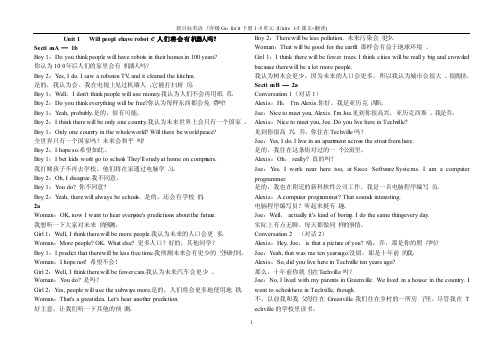
Unit 1 Will p eople have robots? 人们将会有机器人吗?Sectio n A —1bBoy 1:Do you thinkpeople will have robots in theirhomesin 100 years?你认为100年后人们的家里会有机器人吗?Boy 2:Y es, I do. I saw a roboton TV, and it cleane d the kitche n.是的,我认为会。
我在电视上见过机器人,它能打扫厨房。
Boy 1:Well,I don't thinkpeople will use money.我认为人们不会再用纸币。
Boy 2:Do you thinkeveryt hingwill be free?你认为每样东西都会免费吗?Boy 1:Y eah, probab ly.是的,很有可能。
Boy 2:I thinktherewill be only one countr y.我认为未来世界上会只有一个国家。
Boy 1:Only one countr y in the wholeworld? Will therebe worldpeace?全世界只有一个国家吗?未来会和平吗?Boy 2:I hope so.希望如此。
Boy 1:I bet kids won't go to school. They'll studyat home on comput ers.我打赌孩子不再去学校。
他们将在家通过电脑学习。
Boy 2:Oh, I disagr ee.我不同意。
Boy 1:Y ou do? 你不同意?Boy 2:Y eah, therewill always be school s. 是的,还会有学校的。
2013年新版(Go for it)八年级英语下册课文word版

Go for it 八年级下册课文Unit 1 What’s the matter?Section ABus Driver and Passengers Save an Old ManAt 9:00 a.m.yesterday,bus No.26 was going along Zhonghua Road when the driver saw an old man lying on the side of the road .A woman was next to him ,shouting fou help.The bus drive ,24-year-old Wang Ping,stopped the bus without thinking twice.He got off and asked the woman what happened.She said that the man han a heart problem and should go to the hospital .Mr.Wang knew he had to act quickly.He told the passengers that he must take the man to the hospital.He expected most or all of the passengers to get off and wait for then next bus.But to his surprise ,they all agreed to go with him .Some passengers helped Mr.Wang to move the man on the bus.Thanks to Mr.Wang and the passengers ,the doctors saved the man in time .“It’s sad that many people don’t want to help others because they don’t want any trouble,”says one passenger.“But the driver didn’t think about himself .He only thought about saving a life.”Section BHe Lost His Arm But Is Still Climbing.Aron Ralston is an American man who is interested in mountain climbing. As a mountain climber, Aron is used to taking risks. This is one of the exciting things about doing dangerous sports. There were many times when Aron almost lost his life because of accidents. On April 26,2003, he found himself in a very dangerous situation when climbing in Utah.On that day, Aron’s arm was caught under a 2,000-kilo rock that feel on him when he was climbing by himself in the mountains. Because he could not free his arm, she stayed there for five days and hoped that someone would find him. But when his water ran out, he knew that he would have to do something to save his own life. He was not ready to die that day. So he used his knife to cut off half his right arm. Then, with his left arm, he bandaged himself so that he would not lose too much blood. After that, he climbed down the mountain to find help.After losing his arm, he wrote a book called Between a Rock and a Hard Place. This means being in a different situation that you cannot seem to get out of. In this book, Aron tells of the importance of making good decisions, and of being in control of one’s life. His love for mountain climbing is so great that he kept on climbing mountains even after this experience.Do we have the same spirit as Aron? Let’s think about it before we find ourselves “between a rock and a hard place”, and before we have to make a decision that could mean life or death.Unit 2 I’ll help to clean up the city parks.Section AStudents Who VolunteerMario Green and Mary Brown from Riverside High School give up several hours each week to help others.Mario loves animals and wants to be an animal doctor. He volunteers at an animal hospital every Saturday morning. Mario believes it can help him to get his future dream job. “It’s hard work,” he says, “but I want to learn more about how to care for animals. I get such a strong feeling of satisfaction when I see the animals get better and the look of joy on their owners’ faces.”Mary is a book lover. She could read by herself at the age of four. Last year, she decided to try out for a volunteer after-school reading program. She still works there once a week to help kids learn to read. “The kids are sitting in the library, but you can see in their eyes that they’re going on a different journey with each new book. V olunteering here is a dream come true for me. I can do what I love to do and help others at the same time.”Section BDear Miss Li,I’d like to thank you for sending money to Animal Helpers. I’m sure you know that this group was set up to help disabled people like me. You helped to make it possible for me to have Lucky. Lucky makes a big difference to my life. Let me tell you my story.What would it be like to be blind or deaf? Or imagine you can’t walk or use your hands easily. Most people would never think about this, but many people have these difficulties. I can’t use my arms or legs well, so normal things like answering the telephone, opening and closing doors, or carrying things are difficult for me. Then one day last year, a friend of mine helped me out. She talked to Animal Helpers about getting me a special trained dog. She also thought a dog might cheer me up. I love animals and I was excited about the idea of having a dog.Unit 3 Could you please clean your room?Section A1.Why was Nancy’s mom angry with Nancy?2.Did they solve the problem? How?Last month, our dog welcomed me when I came home from school. He wanted a walk, but I was too tired. I threw down my bag and went to the living room. The minute I sat down tin front of the TV, my mom came over. “Could you please take the dog for a walk?” she asked.“Could I watch one show first?”I asked.“No!” She replied angrily. “You watch TV all the time and never help out around the house! I can’t work all day and do housework all evening.”“Well, I work all day at school, too! I’m just as tired as you are!” I shouted back.My mom did not say anything and walked away. For one week, she did not do any housework and neither did I. Finally, I could not find a clean dish or a clean shirt.The next day, my mom came home from work to find the house clean and tidy.“What happened?” she asked in surprise.“I’m so sorry, Mom. I finally understand that we need to share the housework to have a clean and comfortable home,” I replied.Section BDear Sir,I think it is important for children to learn how to do chores and help their parents with housework. It’s not enough to just get good grades at school. Children these days depend on their parents too much. They’re always asking, “Could you get this for me?”or “Could you help me with that?”Doing chores helps to develop children’s independence and teaches them how to look after themselves. It also heops them to understand the idea of fairness. Since they live in one house with their parents, they should know that everyone should do their part in keeping it clean and tidy. Our neighbor’s son got into a good college but during his first year, he had no idea how to take care of himself. As a result, he often fell ill and his grades dropped. The earlier kids learn to be independent, the better it is for their future.Ms. MillerUnit 4 why don’t you talk to your mother?Section ADear Mr. Hunt,My problem is I can’t get on with my family. Relations between my parents have become difficult. They fight a lot, and I really don’t like it. It’s the only communication they have. I don’ t know if I should say anything to them about this. When they argue, it’s like a big, black cloud hanging over our home. Also, my elder brother is not very nice to me. He always refuses to let me watch my favourite TV show. Instead he watches whatever he wants until late at night. I don’t think this is fair. At home I always feel lonely and nervous. Is that normal? What can I do?Sad and ThirteenSection BMaybe you should learn to relax.The Taylors are a typical American family. Life for Cathy Taylor’s three children is very busy. “On most days after school,” Cathy says, “I take one of my two boys to basketball practice and my daughter to football training. Then I have to take my other son to piano lessons. Maybe I could cut out a few of their activities, but I believe these activities are important for my children’s future. I really want them to be successful.”However, the tired children don’t get home until after 7:00 p.m. Theyhave a quick dinner, and them it’s time for homework.Linda Miller, a mother of three, knows all about such stress. “In some families, competition starts very young and continues until the kids get older,”she says. “Mothers send their small kids to all kinds of classes. And they are always comparing them with other children. It’s crazy. I don’t think that’s fair. Why don’t they just let their kids be kids? People shouldn’t push their kids so hard.”Unit5 What were you doing when the rainstorm came?Section AThe Storm Brought People Closer Together Ben could hear strong winds outside his home in Alabama. Black clouds were making the sky very dark.With no light outside, it felt like midnight.The news on TV reported that a heavy rainstorm was in the area. Everyone in the neighborhood was busy. Ben's dad was putting pieces of wood over the windows while his mom was making sure the flashlights and radio were working.She also put some candles and matches on the table. Ben was helping his mom make dinner when the rain began to beat heavily against the windows. After dinner, they tried to play a card game, but it was hard to have fun with a serious storm happening outside.Ben could not sleep at first. He finally fell asleep when the wind was dying down at around 3:00 a.m. When he woke up, the sun was rising, He went outside with his family and found the neighborhood in a mess. Fallen trees,broken windows and rubbish were everywhere. They joined the neighbors to help clean up the neighborhood together. Although the storm broke many things apart, it brought families and neighbors closer together.Section BDo You Remember What Y ou Were Doing? before you read the whole text.People often remember what they were doing when they heard the news of important events in history. In America,for example, many people remember what they were doing on April 4, 1968. This was an important event in American history. On this day, Dr. Martin Luther King was killed. Although some people may not remember who killed him, they remember what they were doing when they heard the news. Robert Allen is now over 50, but he was a school pupil at that time. “It was a bright, sunny day,”Robert remembers. “We were having fun in the playground when the school bell rang. Our teacher said, ‘Dr. King died just 10 minutes ago. We were completely surprised!”School closed for the day, and Robert and his friends walked home in silence.More recently, most Americans remember what they were doing when the World Trade Center in New York was taken down by terrorists. Even the date —September 11, 2001 —has meaning to most Americans. This was a day Kate Smith will never forget. She remembers working in her office near the two towers. “My friend shoutedthat a plane just hit the World Trade Center! I didn't believe him at first, but then I looked out the window and realized that it was true. I was so scared that I could hardly think clearly after that.”Unit 6 An old man tried to move the mountains.Section AIn November 1979, pupils in England were able to watch a new TV program called Monkey. Most of them were hearing this story for the first time. However, this story is not new to Chinese children.The Monkey King or Sun Wukong is the main character in the traditional Chinese book Journey to the West.The story says that once upon a time there was a magic rock. One day, it suddenly broke open and gave birth to a monkey. To fight bad people, the Monkey King uses a magic stick. Sometimes he can make the stick so small that he can keep it in his ear. At other times, he is able to make it big and long. Sun Wukong can also make 72 changcs to his shape and size, turning himself into different animals and objects. But unless he can hide his tail, he cannot turn himself into a person.The Monkey King has excited the childrcn of China for many years. And as soon as the TV program came out more than 30 years ago, Western children became interested in reading this story because the clever Monkey King keeps fighting to help the weak and neer gives up.Section BHansel and Gretel Hansel and Gretel lived near a forest with their father and stepmother. One year, the weather was so dry that no food would grow. The wife told her husband that unless he left the children to die in the forest, the whole family would die.Gretel heard this, and Hansel made a plan to save himself and his sister. SCENE ONE:Gretel:Did you hear our stepmother planning to kill us?Hansel:Don't worry! I have a plan to save us.Gretel:How can you save us?Hansel: Be quiet! I'm going outside to get something in the moonlight.Now, go to sleep.SCENE TWO:Wife: Get up, lazy children!Husband:Yes, dears.You must come with me to the forest to get wood.Wife: Here's some bread.Don’t eat it until you get to the forest.SCENE THREE:Gretel:Hansel, what are you doing?Hansel:I'm dropping white stones along the way. Unless I do,we'll be lost. Tonight, when the moon is shining bright,we'll be able to see the stones.SCENE FOUR:Wife: You bad children! What a long time you slept in the forest!Husband:We thought you were never coming back.Wife: Now, go to bed. As soon as you wake up, you must go to the forest withyour father.Hansel: What, again? I want to go out to look at the moon.Wife: No. You can't go out now.SCENE FIVE:Gretel:What can we do? You have no more stones.Hansel:I’ll drop pieces ofbread. As soon as the moon rises,we can follow them instead.SCENE SIX:Gretel:I can't see any bread on the ground. Maybe it was the birds.Hansel: Never mind! Just keep walking. Unless we do, we won’t find our way out. SCENE SEVEN:Gretel:Hansel,we're really lost!Hansel: Listen! That bird's song is so beautiful that we should follow it.Gretel:Look! It's leading us to that wonderful house made of bread, cake and sugar. Hansel:Let's eat part of the house!(Then they heard an old woman's voice from inside the house.)V oice:Who is that? Who is brave enough to eat my house?Unit 7 What’s the highest mountain in the world?Section AQomolangma —the Most Dangerous Mountain in the World?One of the world's most dangerous sports is mountain climbing, and one of the most popular places for this is the Himalayas.The Himalayas run along the southwestern part of China.Of all the mountains, Qomolangma rises the highest and is the most famous. It is 8,844.43 metres high and so is very dangerous to climb. Thick clouds cover the top and snow can fall very hard. Even more serious difficulties include freezing weather conditions and heavy storms. It is also very hard to take in air as you get near the top.The first people to reach the top were Tenzing Norgay and Edmund Hillary on May 29 1953.The first Chinese team did so in 1960, while the first woman to succeed was Junko Tabei from Japan in 1975. Why do so many climbers risk their lives? One of the main reasons is because people want to challenge themselves in the face of difficulties. The spirit of these climbers shows us that we should never give up trying to achieve our dreams.It also shows that humans can sometimes be stronger than theforces of nature.Section BThis means moving your eyes quickly down the page to fin for the baby pandas’breakfast. At 9:00 a.m., they find specific information that most of the babies are already awake and hungry.When the babies see the keepers, they run over with excitement and some of them even walk into their friends and fall over!“They're so cute and lovely.I take care of them like they're my own babies.I wash,feed and play with them every day.They're very special to me.”Lin Wei loves her job, but it is a difficult one.Pandas do not have many babies,maybe only one every two years. The babies often die from illnesses and do not live very long. Adult pandas spend more than 12 hours a day eating about 10 kilos of bamboo. Many years ago, there were a lot more bamboo forests and pandas in China than there are now. But then humans started to cut down the forests,and there was less bamboo for the pandas. Scientists say there are now fewer than 2,000 pandas living in the remaining forests. Another 200 or so live in zoos or research centers in China and other countries.An education program in Chengdu teaches children in cities about pandas and other endangered animals. They send people to schools to tell children about the importance of saving these animals. The children sing songs or make artwork about pandas and other wild animals. Teaching children is one way to help save pandas. The Chinese government is also planting more bamboo trees so there will be more forests for pandas to live in.We all hope that in the future there will be a lot more pandas than now.Unit 8 Have you read Treasure Island yet?Section AWhen I first arrived on this island, I had nothing, But I’ve found the ship and made a small boat. I've brought back many things I can use —food and drink, tools, knives and guns. Although I have lost everything, I have not lost mylife. So I will not give up and I will wait for another ship. I have already cut down trees andbuilt a house. I go out with my gun almost every day to kill animals and birds for food. I'meven learning to grow fruits and vegetables.A few weeks ago, I found the marks of another man's feet on the sand. Who else is on my island? How long have they been here? Not long after that, I saw some cannibals trying to kill two men from a broken ship. One of them died but the other ran towards my house. I helped him kill the cannibals. This man now lives with me and helps me. I named him Friday because that was the day I met him. He is smart and I have already taught him some English.Section BSummarzingA Country Music Song Changed Her Life Forever When Sarah was a teenager, she in your own words. used to fight over almost everything with her family. Butfive years ago, while she was studying abroad in England,she heard a song fullof feelings about returning home on the radio. It made Sarah think about her family and friends back in the US. She came to realize how much she actually missed all of them.Ever since then,she has been a fan of American country music.Country is a traditional kind of music from the southern states of America.Nashville, Tennessee is the home of country music. Many songs these days are just about modern life in the US, such as the importance of money and success, but not about belonging to a group. However, country music brings us back to the “good old days”when people were kind to each other and trusted one another. It reminds us that the best things in life are free —laughter, friends, family, and the beauty of nature and the countryside.Sarah hasn’t been to Nashville yet, but it is her dream to go there one day. She has already read a lot about the place and done some research on it. She knows that there is a Country Music Hall of Fame Museum in Nashville.There are also always a lot of great country music concerts with famous musicians and singers, like Garth Brooks. Sarah has already listened to most of his songs. “Garth is one of the most successful musicians in American history.He's sold more than 120 million records.I hope to see him sing live one day!”Unit 9 Have you ever been to a museum?Section AThree students talk about the most interesting museums they have ever been to. Read the magazine article and answer the questions.Ken: The most interesting museum I’ve ever been to is the American Computer Museum.They have information about different computers and who invented them. The old computers were much bigger. It's unbelievable that technology has progressed in such a rapid way! I've also learned that there was a special computer. It could play chess even better than humans. I wonder how much more computers will be able to do in the future.Amy: I've recently been to a very unusual museum in India, the International Museum of Toilets. I just couldn’t believe my eyes when I saw so many different kinds of toilets there.The museum teaches people about the history and development of toilets. It also encourages governments and social groups to think about ways to improve toilets in the future.Linlin: Last year I went to the Hangzhou National Tea Museum. It's a relaxing and peaceful place near a lake. The tea art performances show how to make a perfect cup of tea. Watching them prepare the tea with the beautiful tea sets is just as enjoyable as drinking the tea itself. I’ve finally realized why my grandpa loves drinking tea and collecting tea sets.Section BSingapore —A Place You Will Never Forget!Have you ever been to Singapore? For thousands of tourists from China, this small island in Southeast Asia is a wonderful and safe place to take a holiday. On the one hand, more than three quarters of the population are Chinese,so you can simplyspeak Putonghua a lot of the time.On the other hand, Singapore is an English-speaking country, so it's also a good place to practice your English!Have you ever tried Chinese food outside of China? Maybe you fear that you won't be able to find anything good to eat when you travel. In Singapore however, you'll find a lot of food from China; you won't have any problem getting rice, noodles or dumplings. Singapore is also an excellent place to try new food. Whether you like Indian food, Western food or Japanese food, you'll find it all in Singapore!Most large cities have zoos, but have you ever been to a zoo at night? Singapore has a Night Safari. It might seem strange to go to a zoo when it's dark.However, if you go to see lions, tigers or foxes during the daytime, they'll probably be asleep! A lot of animals only wake up at night, so this is the best time to watch them. At the Night Safari, you can watch these animals in a more natural environment than in a normal zoo.One great thing about Singapore is that the temperature is almost the same all year round.This is because the island is so close to the equator. So you can choose to go whenever you like —spring, summer, autumn or winter.And, of course, it's not too far from China!Unit 10 I’ve had this bike for three years.Section AMy children are growing up fast. My daughter is 16 and my boy has just started junior high school. As they get bigger our house seems to get smaller. So we’ve been clearing out a lot of things from our bedrooms for a yard sale. We've decided to each sell five things we no longer use.We'll give the money we raise to a children's home.My son was quite sad at frst. He found a lot of toys that he doesn’t play with anymore but still wanted to keep. For example, he's owned a train and railway set since his fourth birthday, and he played with it almost every week until he was about seven. And he didn't want to lose the toy monkey he's had since birth. I remember when he would never go to bed without it. My daughter was more understanding, although she also felt sad to part with certain toys.As for me, I didn't want to give up my football shirts, but, to be honest, I haven't played for a while now. I’'mgetting older, too!Section BHometown FeelingsSome people still live in their hometown.However,others may only see it once or twice a year. Nowadays,millions of Chinese leave the countryside to search for work in the cities. Among these is Zhong Wei, a 46-year-old husband and father. He has lived in Wenzhou for the last 13 years. With a hard job in a crayon factory, he doesn’tfind much time to visit his hometown. “I usedto return home at least once a year, but I haven't been back for almost three years now. It's a shame, but I just don't have the time," he says.Many people like Zhong Wei regard with great interest how their hometowns have changed. Perhaps large hospitals and new roads have appeared. In many places, the government has also built new schools and sent teachers from the cities to help.“I noticed that's true of my hometown,”adds Zhong Wei. “Children have learned to read andcount at my old primary school since the mid-20th century. But now the buildings are really old. I hear they're going to build a new school there." Zhong Wei thinks such developments are good, and he also knows that his hometown cannot always stay the same.According to Zhong Wei, however, some things will never change. “In my hometown, there was a big old tree opposite the school. It is still there and has become quite a symbol of the place. Most of the children in my time liked to play together under that big tree, especially during the summer holidays.It was such a happy childhood.Our hometown has left many soft and sweet memories in our hearts.”。
go for it英语 八年级下 unit2
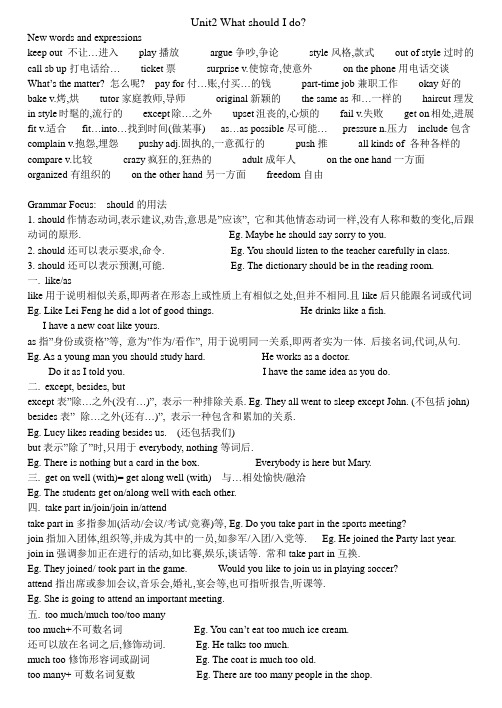
Unit2 What should I do?New words and expressionskeep out 不让…进入play播放argue争吵,争论style风格,款式out of style过时的call sb up打电话给…ticket票surprise v.使惊奇,使意外on the phone用电话交谈What’s the matter? 怎么呢? pay for付…账,付买…的钱part-time job兼职工作okay好的bake v.烤,烘tutor家庭教师,导师original新颖的the same as和…一样的haircut理发in style时髦的,流行的except除…之外upset沮丧的,心烦的fail v.失败get on相处,进展fit v.适合fit…into…找到时间(做某事)as…as possible尽可能…pressure n.压力include包含complain v.抱怨,埋怨pushy adj.固执的,一意孤行的push推all kinds of 各种各样的compare v.比较crazy疯狂的,狂热的adult成年人on the one hand一方面organized有组织的on the other hand另一方面freedom自由Grammar Focus:should的用法1. should作情态动词,表示建议,劝告,意思是”应该”, 它和其他情态动词一样,没有人称和数的变化,后跟动词的原形. Eg. Maybe he should say sorry to you.2. should还可以表示要求,命令. Eg. You should listen to the teacher carefully in class.3. should还可以表示预测,可能. Eg. The dictionary should be in the reading room.一.like/aslike用于说明相似关系,即两者在形态上或性质上有相似之处,但并不相同.且like后只能跟名词或代词Eg. Like Lei Feng he did a lot of good things. He drinks like a fish.I have a new coat like yours.as指”身份或资格”等, 意为”作为/看作”, 用于说明同一关系,即两者实为一体. 后接名词,代词,从句. Eg. As a young man you should study hard. He works as a doctor.Do it as I told you. I have the same idea as you do.二.except, besides, butexcept表”除…之外(没有…)”, 表示一种排除关系. Eg. They all went to sleep except John. (不包括john) besides表”除…之外(还有…)”, 表示一种包含和累加的关系.Eg. Lucy likes reading besides us. (还包括我们)but表示”除了”时,只用于everybody, nothing等词后.Eg. There is nothing but a card in the box. Everybody is here but Mary.三.get on well (with)= get along well (with)与…相处愉快/融洽Eg. The students get on/along well with each other.四.take part in/join/join in/attendtake part in多指参加(活动/会议/考试/竞赛)等, Eg. Do you take part in the sports meeting?join指加入团体,组织等,并成为其中的一员,如参军/入团/入党等. Eg. He joined the Party last year. join in强调参加正在进行的活动,如比赛,娱乐,谈话等. 常和take part in互换.Eg. They joined/ took part in the game. Would you like to join us in playing soccer?attend指出席或参加会议,音乐会,婚礼,宴会等,也可指听报告,听课等.Eg. She is going to attend an important meeting.五.too much/much too/too manytoo much+不可数名词Eg. You can’t eat too much ice cream.还可以放在名词之后,修饰动词. Eg. He talks too much.much too修饰形容词或副词Eg. The coat is much too old.too many+ 可数名词复数Eg. There are too many people in the shop.Tell Me Why歌词及中文意思In my dream, children sing . A song of love for every boy and girl.The sky is blue and fields are green. And laughter is the language of the world.Then I wake and all I see, is a world full of people in need.Tell me why(why) does it have to be like this? Tell me why (why) is there something I have missed?Tell me why (why) cause I don't understand.When so many need somebody, we don't give a helping hand. Tell me why?Everyday I ask myself. What will I have to do to be a man?Do I have to stand and fight, to prove to everybody who I am?Is that what my life is for, to waste in a world full of war?Tell me why(why) does it have to be like this? Tell me why (why) is there something I have missed?Tell me why (why) cause I don't understand.When so many need somebody, we don't give a helping hand. Tell me why?Tell me why? Tell me why? Tell me why? Tell me why? Just tell me why, why, why? ……Tell me why (why, why does the tiger run) Tell me why(why, why do we shoot the gun)Tell me why (why, why do we never learn) Can someone tell us why we let the forest burn?(why, why do we say we care) Tell me why(why, why do we stand and stare)Tell me why(why, why do the dolphins cry) Can some one tell us why we let the ocean die?(why, why if we're all the same) Tell me why(why, why do we pass the blame)Tell me why (why, why does it never end) Can some one tell us why we cannot just be friends中文歌词大意:在我的梦中少年总在唱着一首关于男孩和女孩的恋歌那里有蔚蓝的天空翠绿的原野笑声是这个地球上共同的语言然而当我醒来看到的却是一个满布穷苦的世界告诉我这一切为什么会变成这样....为什么我们面对这么多贫穷的人却不能伸出援手我要做怎样一个人难道必须要做靠孤立和争斗来证实自己存在的人难道我生来就为了在充满战争的世界里浪费生命告诉我为什么为什么为什么...告诉我为什么?(为什么,为什么,老虎要逃离家园?)告诉我为什么?(为什么,为什么我们要端枪射击谁?)告诉我为什么?(我从来没被教过生存是这样残忍) 难道大人们,你们没有人告诉我们为什么让森林忍受炮火煎熬. (为什么,为什么,难道我们不关心这一切么?)告诉我为什么(为什么为什么我们这样僵持对视,仿如敌人)告诉我为什么(为什么,为什么海豚要尖叫躁动?) 难道没人能告诉我们为什么我们让海洋一片死寂?相关资料:Declan Galbraith是英国的一位小歌手,他的首张专辑在英国畅销,英国小歌手Declan曾演唱过Walking In The Air收录在一张圣诞合辑Christmas Hits里, 这首歌也有许多童声演唱过, 但Declan演唱起来格外的高亢动人. 他的《Carrickfergus》,刚开始凯尔特音乐的旋律很吸引人,再听一下Declan的声音,不可想像一个童声居然能唱出如此高亢又甜美的声音,都感觉有点天簌之声的味了! Declan Galbraith是居住在英国肯特郡的爱尔兰男孩。
新目标(Go for it)英语八年级下册

新目标(Go for it)英语八年级下册Unit3What were you doing when the UFO arrived?第一课时(Section A 1a-2c)南康市朱坊中学吴晓凤教学目标:1. 知识目标:要求学生掌握使用过去进行时。
2. 能力目标:让学生做课堂的主人,同时培养他们掌握一些行之有效的学习方法,优化课堂学习效果。
3. 情感目标:让学生爱上英语课堂活动,鼓励他们在课堂上进行合作交流。
4.学习策略目标:设法使学生掌握使用英语进行交流,学习积极参与班级活动.教学重点:如何使用过去进行时。
教学难点: 如何在由when和while引导的时间状语从句中使用过去进行时。
教学思路:本教案设计遵循《英语新课程标准》的要求,培养学习英语的兴趣,激发teaching 学生学习英语的潜质,使得学生在轻松愉悦的氛围中,学会本节课需要掌握的四会单词,短语及句子,进而用英语进行日常话题的表达及讨论。
课开始,由目前大家关注的雅安地震视频导入,学生兴趣高涨,教师然后引导学生向着本课的重点内容谈论。
在任务设计及其实施的过程中,层层递进,操练到位,最后小组活动中,用过去进行时描述图中的故事:一个小偷偷走了一个女孩子的单车故事。
引领学生运用所学知识,在具体情境下运用过去进行时,至此,课堂氛围高潮迭起,学生们上了一节丰富多彩的英语课。
教学内容:新目标(Go for it)英语八年级下册Unit3第一课时(Section A 1a-2c)教学方法:(1)多媒体辅助教学法:多媒体辅助教学集图象、声音、文字于一体,使教学内容更生动、形象,吸引学生的注意力,使他们在轻松、愉快的氛围中接受新的知识。
(2)交际法:英语要作为交际工具来教,也要作为交际工具来学,做到学用统一。
笔者在课堂教学中会创造交际活动情境,让学生利用所学的语言知识,自由表达自己的思想和见解,让学生在做中学,在实践交流中获得信息,习得英语。
(3)坚持以学生为中心,采用individual work和pair work相结合的活动方式使学生进行自主学习、合作探究、体验实践及展示自我,发展听、说、读、写等综合语言运用技能。
2014年新人教版英语八年级Goforit下册7-10单元(Units7-10课文+翻译)
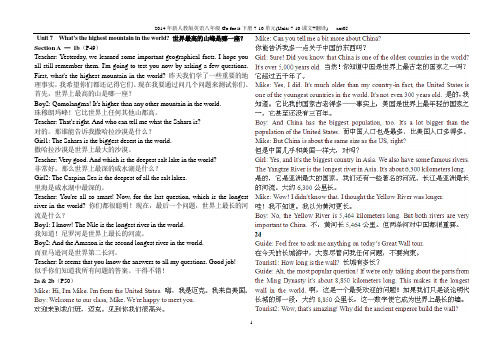
Teacher: Yesterday, we learned some important geographical facts. I hope you all still remember them. I'm going to test you now by asking a few questions. First, what's the highest mountain in the world? 昨天我们学了一些重要的地理事实,我希望你们都还记得它们。
现在我要通过问几个问题来测试你们。
首先,世界上最高的山是哪一座?Boy2: Qomolangma! It's higher than any other mountain in the world.珠穆朗玛峰!它比世界上任何其他山都高。
Teacher: That's right. And who can tell me what the Sahara is?对的。
那谁能告诉我撒哈拉沙漠是什么?Girl1: The Sahara is the biggest desert in the world.撒哈拉沙漠是世界上最大的沙漠。
Teacher: V ery good. And which is the deepest salt lake in the world?非常好。
那么世界上最深的咸水湖是什么?Girl2: The Caspian Sea is the deepest of all the salt lakes.里海是咸水湖中最深的。
Teacher: You're all so smart! Now, for the last question, which is the longest river in the world? 你们都很聪明!现在,最后一个问题,世界上最长的河流是什么?Boy1: I know! The Nile is the longest river in the world.我知道!尼罗河是世界上最长的河流。
go-for-it英语-八年级下-unit5
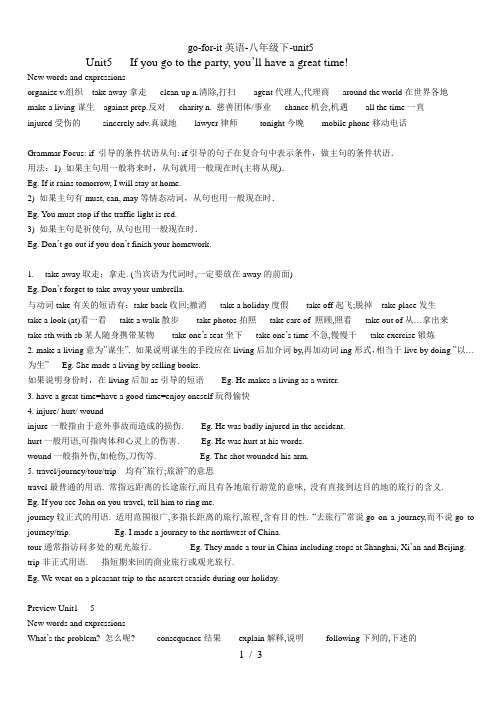
Unit5 If you go to the party, you’ll have a great time!New words and expressionsorganize v.组织take away拿走clean-up n.清除,打扫agent代理人,代理商around the world在世界各地make a living谋生against prep.反对charity n. 慈善团体/事业chance机会,机遇all the time一直injured受伤的sincerely adv.真诚地lawyer律师tonight今晚mobile phone移动电话Grammar Focus: if 引导的条件状语从句: if引导的句子在复合句中表示条件,做主句的条件状语.用法:1) 如果主句用一般将来时,从句就用一般现在时(主将从现).Eg. If it rains tomorrow, I will stay at home.2) 如果主句有must, can, may等情态动词,从句也用一般现在时.Eg. You must stop if the traffic light is red.3) 如果主句是祈使句, 从句也用一般现在时.Eg. Don’t go out if you don’t finish your homework.1.take away取走;拿走. (当宾语为代词时,一定要放在away的前面)Eg. Don’t forget to take away your umbrella.与动词take有关的短语有:take back收回;撤消take a holiday度假take off起飞;脱掉take place发生take a look (at)看一看take a walk散步take photos拍照take care of 照顾,照看take out of从…拿出来take sth with sb某人随身携带某物take one’s seat坐下take one’s time不急,慢慢干take exercise锻炼2. make a living意为”谋生”. 如果说明谋生的手段应在living后加介词by,再加动词ing形式,相当于live by doing ”以…为生”Eg. She made a living by selling books.如果说明身份时,在living后加as引导的短语Eg. He makes a living as a writer.3. have a great time=have a good time=enjoy oneself玩得愉快4. injure/ hurt/ woundinjure一般指由于意外事故而造成的损伤. Eg. He was badly injured in the accident.hurt一般用语,可指肉体和心灵上的伤害. Eg. He was hurt at his words.wound一般指外伤,如枪伤,刀伤等. Eg. The shot wounded his arm.5. travel/journey/tour/trip 均有”旅行;旅游”的意思travel最普通的用语. 常指远距离的长途旅行,而且有各地旅行游览的意味, 没有直接到达目的地的旅行的含义.Eg. If you see John on you travel, tell him to ring me.journey较正式的用语. 适用范围很广,多指长距离的旅行,旅程¸含有目的性. “去旅行”常说go on a journey,而不说go to journey/trip. Eg. I made a journey to the northwest of China.tour通常指访问多处的观光旅行. Eg. They made a tour in China including stops at Shanghai, Xi’an and Beijing. trip非正式用语. 指短期来回的商业旅行或观光旅行.Eg. We went on a pleasant trip to the nearest seaside during our holiday.Preview Unit1----5New words and expressionsWhat’s the problem? 怎么呢? consequence结果explain解释,说明following下列的,下述的1.Watch out! 当心,留神,注意= Be careful!2. in order to 为了,以便后接动词原形,表目的, 有时可与so as to/in order that 互换.其否定形式为in order not to/so as not toEg. He studied hard in order to/so as to pass the exam. =He studied hard in order that he could pass the exam.3. on the earth/on earth1) 在下面的情况下, on the earth和on earth是两个完全不同的习惯用语. on the earth表示”在地球上”, 而on earth表示”在人世, 在世界上”Eg. All lives on the earth depend on the sun.I am ready to do anything on earth to save my mother’s life.2) on earth可用语how, who, what, where, why等疑问词之后, 以加强语气, 意为”究竟, 到底”. 而on the earth无此用法. Eg. Why on earth do you mean?Hey Jude -------------------披头士乐队( The Beatles)Hey Jude, don't make it bad. 嘿Jude 不要这样消沉Take a sad song and make it better. 唱首伤感的歌曲会使你振作一些Remember to let her into your heart, 记住要永远爱她Then you can start to make it better. 开始新的生活Hey Jude, don't be afraid. 嘿Jude 不要担心You were made to go out and get her. 去追她,留下她The minute you let her under your skin, 拥抱她的时候Then you begin to make it better. 将开始新的生活And anytime you feel the pain, 无论何时,当你感到痛苦的时候hey Jude, refrain, 嘿Jude 放松一下自己Don't carry the world upon your shoulders. 不要去担负太多自己能力以外的事For well you know that it's a fool who plays it cool 要知道扮酷是很愚蠢的By making his world a little colder. 生活中总是会有不如意的时候Hey Jude, don't let me down. 嘿Jude 不要让我伤心You have found her, now go and get her. 如果你找到你所爱的人,去爱她吧Remember to let her into your heart, 记住要永远爱她Then you can start to make it better. 生活会更美好So let it out and let it in, hey Jude, begin, 嘿Jude 时光如此飞逝不要耽搁You're waiting for someone to perform with. 不要总是期望依赖旁人And don't you know that it's just you, hey Jude, you'll do, 你知道吗!你自己可以的,嘿Jude,去完成吧The movement you need is on your shoulder. 明白自己要走自己的路Hey Jude, don't make it bad. 嘿Jude 不要这样消沉Take a sad song and make it better. 唱首伤感的歌曲会使你振作一些Remember to let her under your skin, 记住要永远爱她Then you'll begin to make it 然后开始新的生活Better better better better better better, Oh. 会更美好会更幸福。
- 1、下载文档前请自行甄别文档内容的完整性,平台不提供额外的编辑、内容补充、找答案等附加服务。
- 2、"仅部分预览"的文档,不可在线预览部分如存在完整性等问题,可反馈申请退款(可完整预览的文档不适用该条件!)。
- 3、如文档侵犯您的权益,请联系客服反馈,我们会尽快为您处理(人工客服工作时间:9:00-18:30)。
Unit 1 Will people have robots? 人们将会有机器人吗?Section A —1bBoy 1:Do you think people will have robots in their homes in 100 years?你认为100年后人们的家里会有机器人吗?Boy 2:Yes, I do. I saw a robot on TV, and it cleaned the kitchen.是的,我认为会。
我在电视上见过机器人,它能打扫厨房。
Boy 1:Well,I don't think people will use money.我认为人们不会再用纸币。
Boy 2:Do you think everything will be free?你认为每样东西都会免费吗?Boy 1:Yeah, probably.是的,很有可能。
Boy 2:I think there will be only one country.我认为未来世界上会只有一个国家。
Boy 1:Only one country in the whole world? Will there be world peace?全世界只有一个国家吗?未来会和平吗?Boy 2:I hope so.希望如此。
Boy 1:I bet kids won't go to school. They'll study at home on computers.我打赌孩子不再去学校。
他们将在家通过电脑学习。
Boy 2:Oh, I disagree.我不同意。
Boy 1:You do? 你不同意?Boy 2:Yeah, there will always be schools. 是的,还会有学校的。
2aWoman:OK, now I want to hear everyone's predictions about the future.我想听一下大家对未来的预测。
Girl 1:Well, I think there will be more people.我认为未来的人口会更多。
Woman:More people? OK. What else? 更多人口?好的,其他同学?Boy 1:I predict that there will be less free time.我预测未来会有更少的空闲时间。
Woman:I hope not! 希望不会!Girl 2:Well, I think there will be fewer cars.我认为未来汽车会更少。
Woman:You do? 是吗?Girl 2:Yes, people will use the subways more.是的,人们将会更多地使用地铁。
Woman:That's a great idea. Let's hear another prediction.好主意,让我们听一下其他的预测。
Boy 2:There will be less pollution. 未来污染会更少。
Woman:That will be good for the earth! 那样会有益于地球环境。
Girl 1:I think there will be fewer trees. I think cities will be really big and crowded because there will be a lot more people.我认为树木会更少。
因为未来的人口会更多,所以我认为城市会很大、很拥挤。
Section B —2aConversation 1(对话1)Alexis:Hi,I'm Alexis.你好。
我是亚历克西斯。
Joe:Nice to meet you, Alexis. I'm Joe.见到你很高兴,亚历克西斯。
我是乔。
Alexis:Nice to meet you, Joe. Do you live here in Techville?见到你很高兴,乔。
你住在Techville吗?Joe:Yes, I do. I live in an apartment across the street from here.是的。
我住在这条街对过的一个公寓里。
Alexis:Oh,really? 真的吗?Joe:Yes. I work near here too, at Sisco Software Systems. I am a computer programmer.是的,我也在附近的新科软件公司工作。
我是一名电脑程序编写员。
Alexis:A computer programmer? That sounds interesting.电脑程序编写员?听起来挺有趣。
Joe:Well,actually it's kind of boring. I do the same thing every day.实际上有点无聊。
每天都做同样的事情。
Conversation 2 (对话2)Alexis:Hey, Joe,is that a picture of you? 嗨,乔,那是你的照片吗?Joe:Yeah, that was me ten years ago.没错,那是十年前的我。
Alexis:So, did you live here in Techville ten years ago?那么,十年前你就住在Techville吗?Joe:No, I lived with my parents in Greenville. We lived in a house in the country. I went to school here in Techville, though.不,以前我和我父母住在Greenville.我们住在乡村的一所房子里。
尽管我在Techville的学校里读书。
1Alexis:Really? That's pretty far from here. How did you get to school?真的吗?那离这相当远。
你怎么上学?Joe:Oh,I took the train to school.我坐火车上学。
Conversation 3 (对话3)Alexi5:So, Joe, what do you think your life will be like in ten years?那么,乔,你认为十年后你的生活会是什么样?Joe:Oh, I think I'll be an astronaut.噢,我想我会成为一名宇航员。
Alexis:An astronaut? Are you kidding? 宇航员?你在开玩笑吗?Joe:No, I'm serious. I'll fly rockets to the moon. Maybe there will be flights to other planets.不,我是认真的。
我要乘火箭去月球。
可能会有到其他行星的飞行。
Alexis:Oh, and where will you live? 噢,那你会住在哪?Joe:I'll live on a space station.我会住在空间站里。
3aIn ten years, I think I'll be a reporter. I'll live in Shanghai, because I went to Shanghai last year and fell in love with it. I think it's really a beautiful city. As a reporter, I think I will meet lots of interesting people. I think I'll live in an apartment with my best friends, because I don't like living alone. I'll have pets. I can't have any pets now because my mother hates them, and our apartment is too small. So in ten years, I'll have many different pets. I might even keep a pet parrot! I'll probably go skating and swimming every day. During the week I'll look smart, and probably will wear a suit. At the weekends, I'll be able to dress more casually. I think I'll go to Hong Kong on vacation, and one day I might even visit Australia.在10年后,我认为我将是一名记者。
我将居住在上海,因为我去年去过上海并且喜欢上了它。
我认为它的确是一座美丽的城市。
作为一名记者,我认为我将见到许多有趣的人。
我认为我将与我最好的朋友住在一套公寓里,因为我不喜欢独自生活。
我将有宠物。
我现在不能有任何宠物,因为我的母亲讨厌他们,并且我们的公寓太小。
因此10年后,我将有很多不同的宠物。
我甚至可能饲养一只宠物鹦鹉!或许我每天都会去滑冰和游泳。
周日期间我看起来会很漂亮,或许我还会穿上套装呢。
在周末,我的着装会更随便。
我想我将去香港度假,并且甚至有一天我可能会访问澳大利亚。
Self Check —2Predicting the future can be difficult. There are many famous predictions that never came true. Before 1929, there Was no sound in movies. The head of one of the biggest movie companies in the United States predicted that no one would wart to see actors talk. Of course, he was wrong! In 1977, the head of the largest computer company in the United States said, “No one will want to have a computer in his or her home. He thought that computers would never be used by most people.”预言将来可能是难的。
